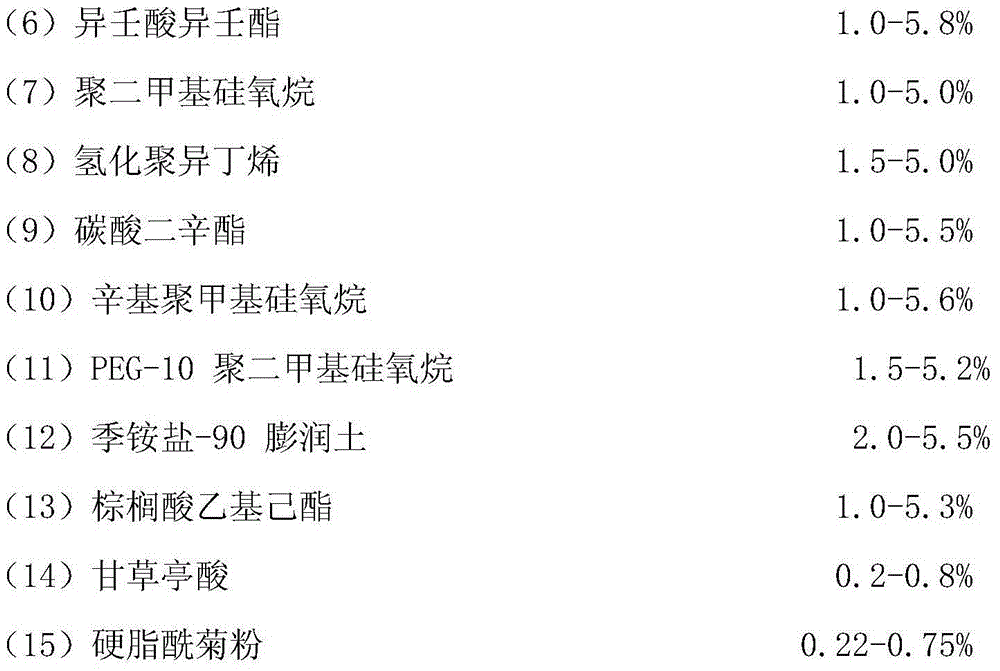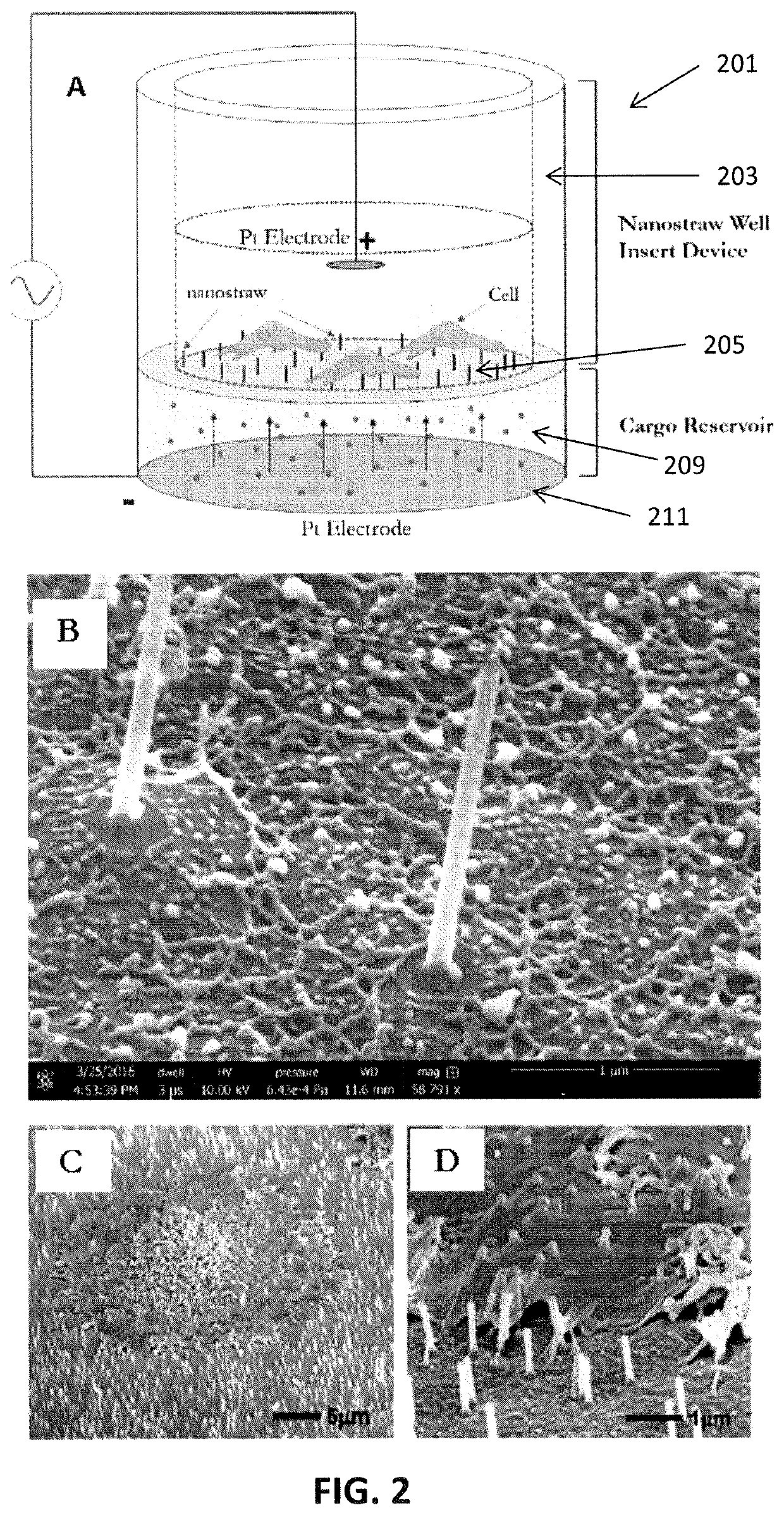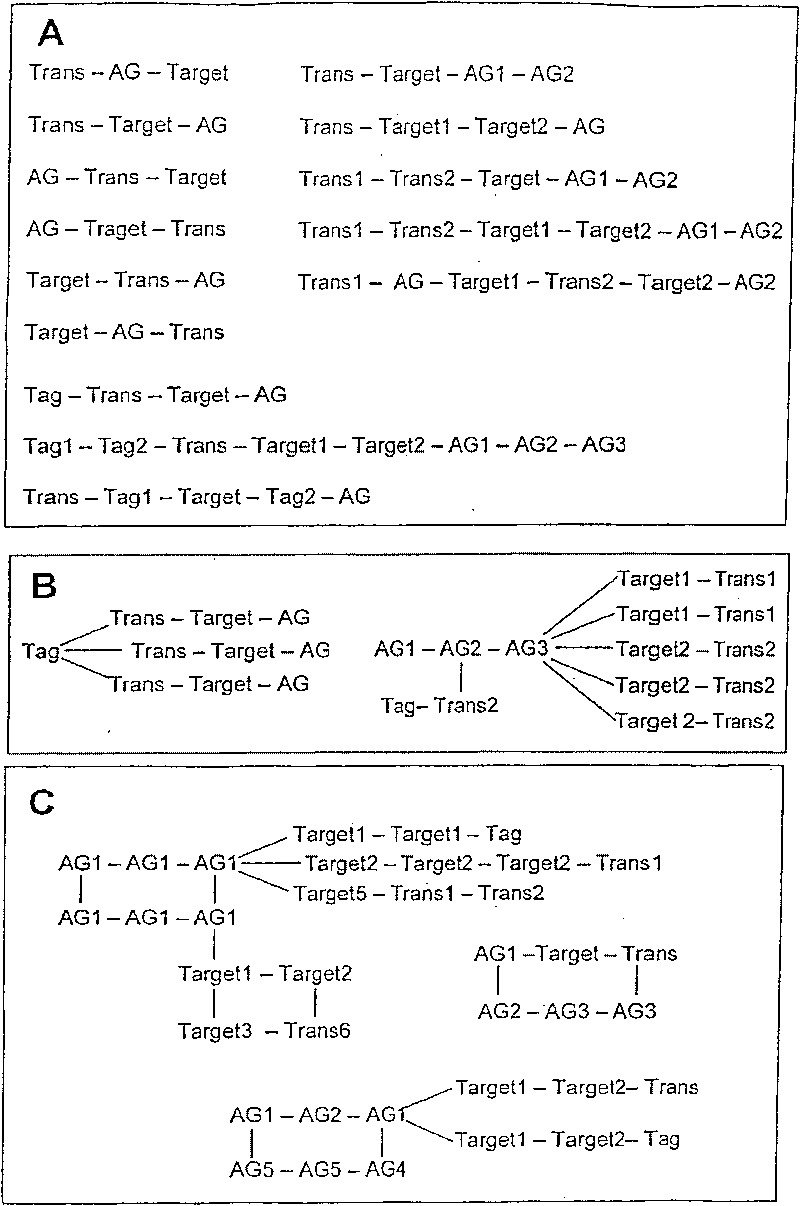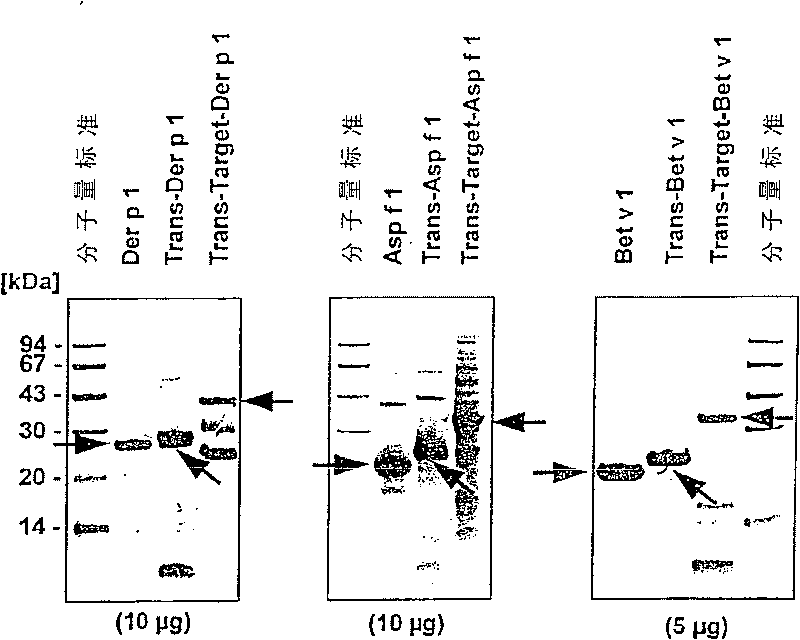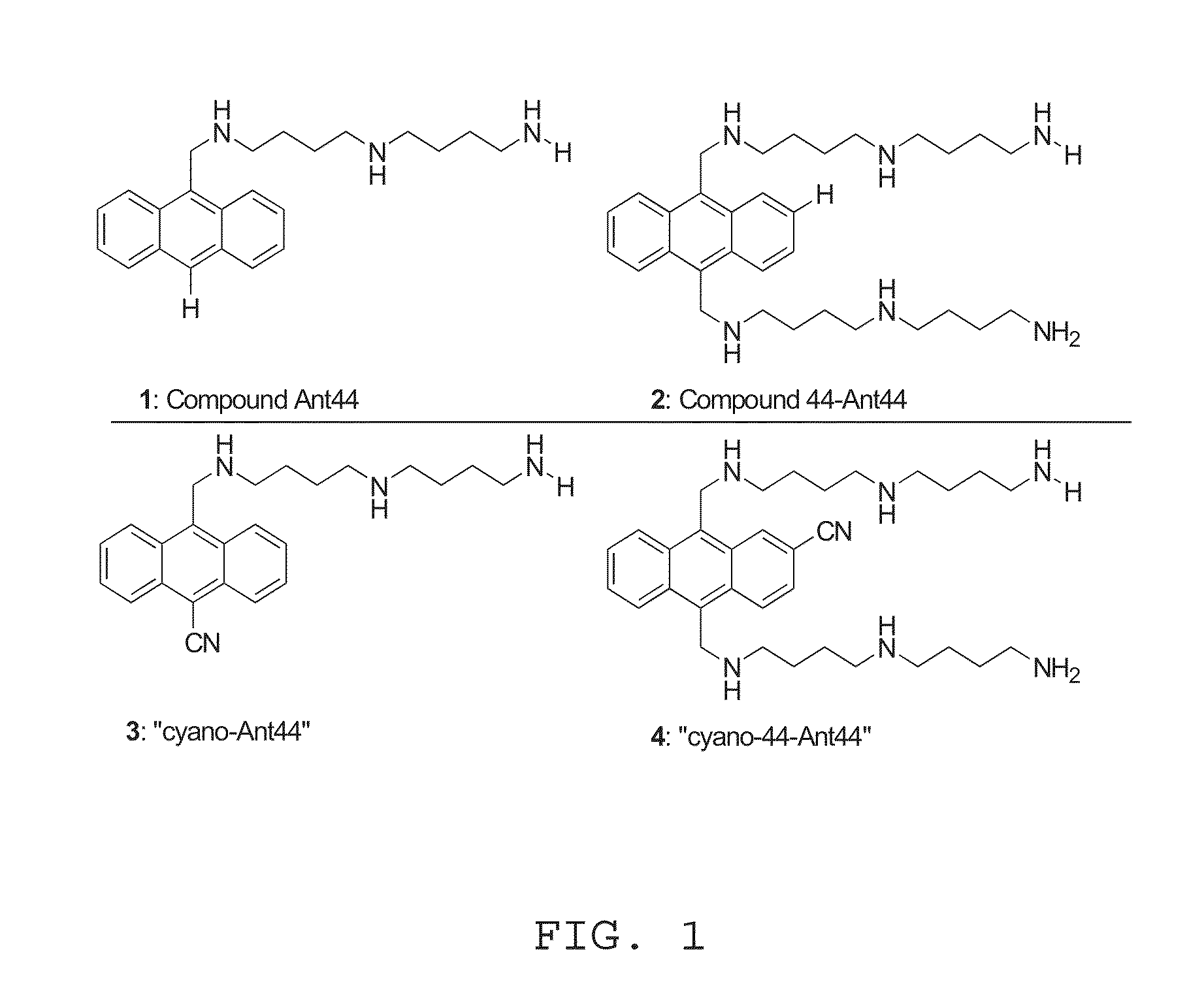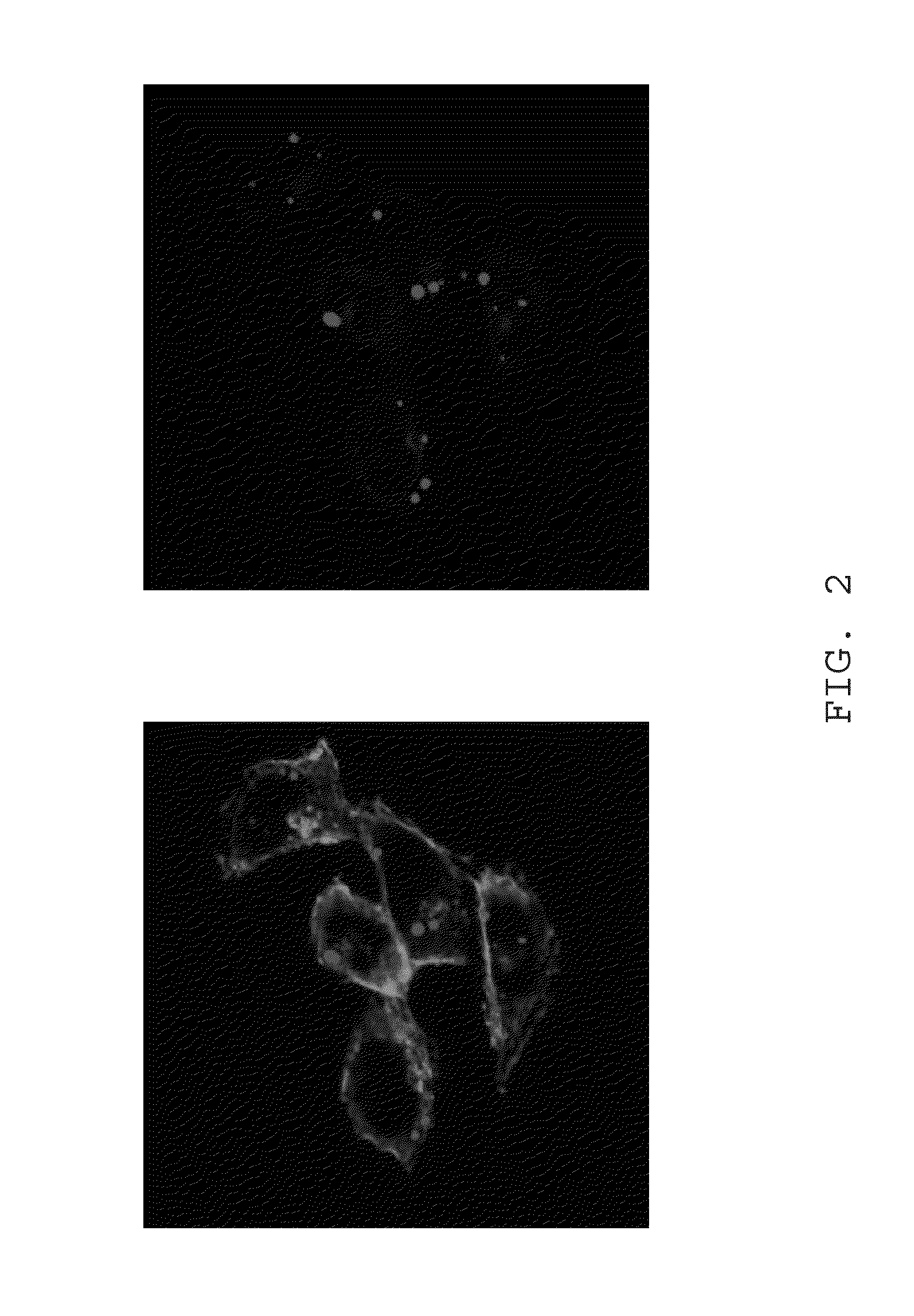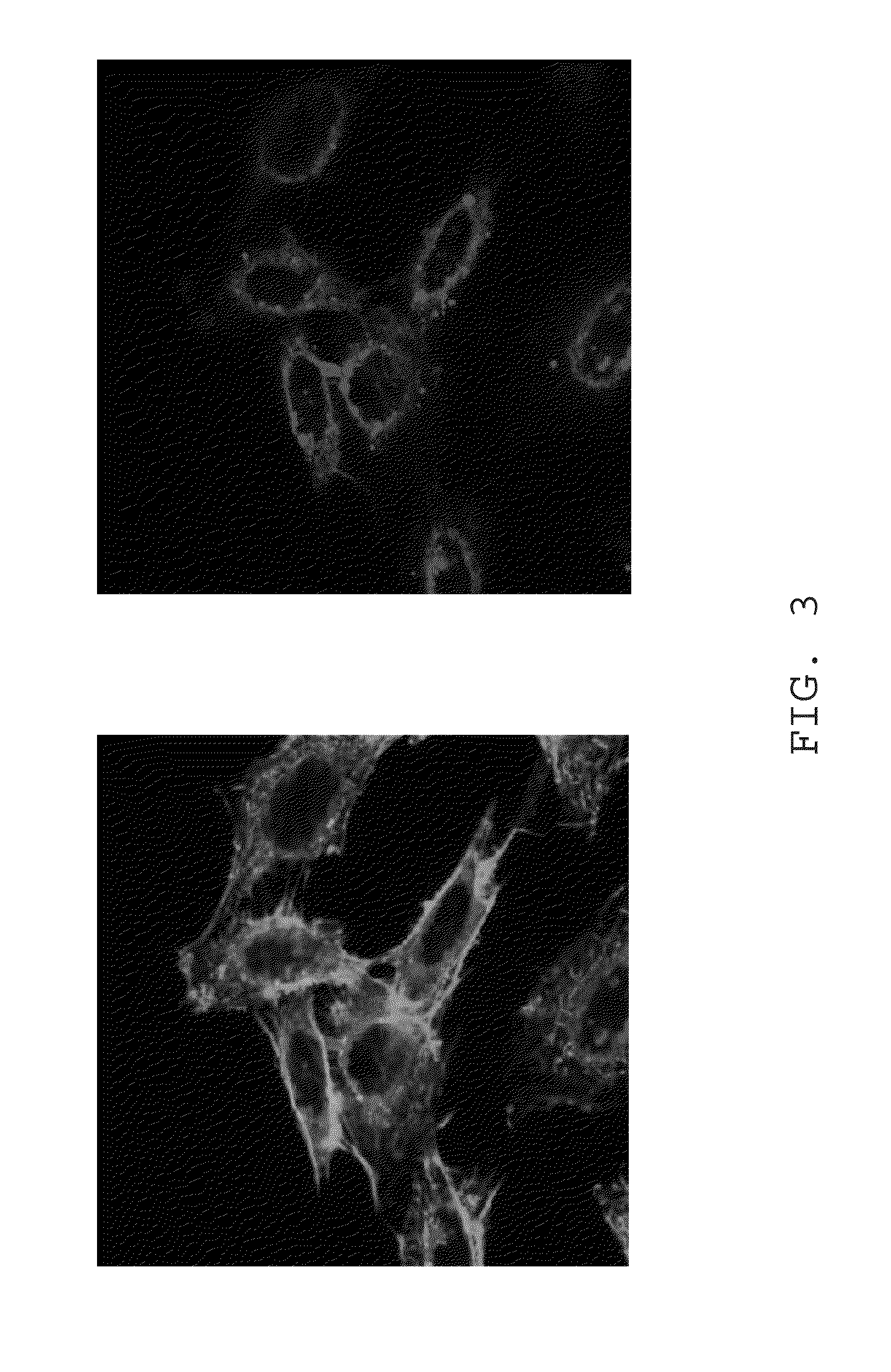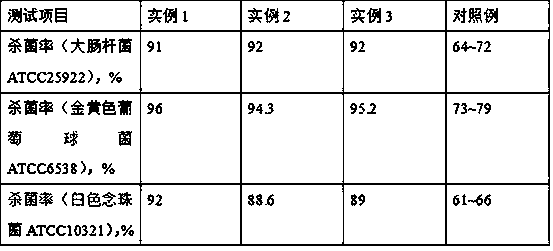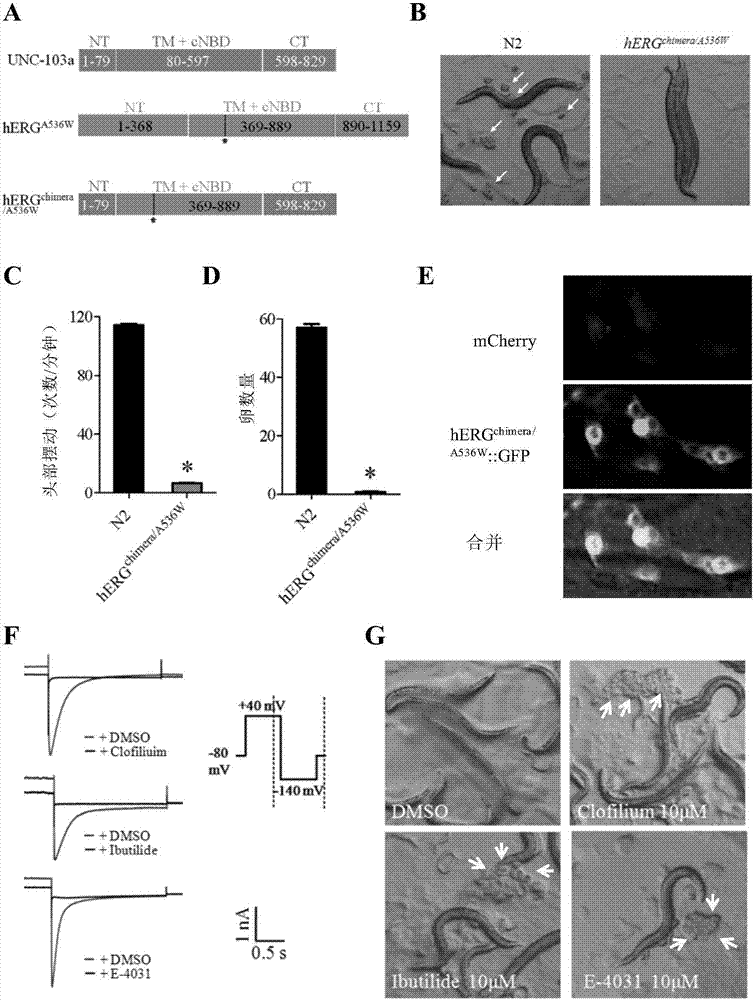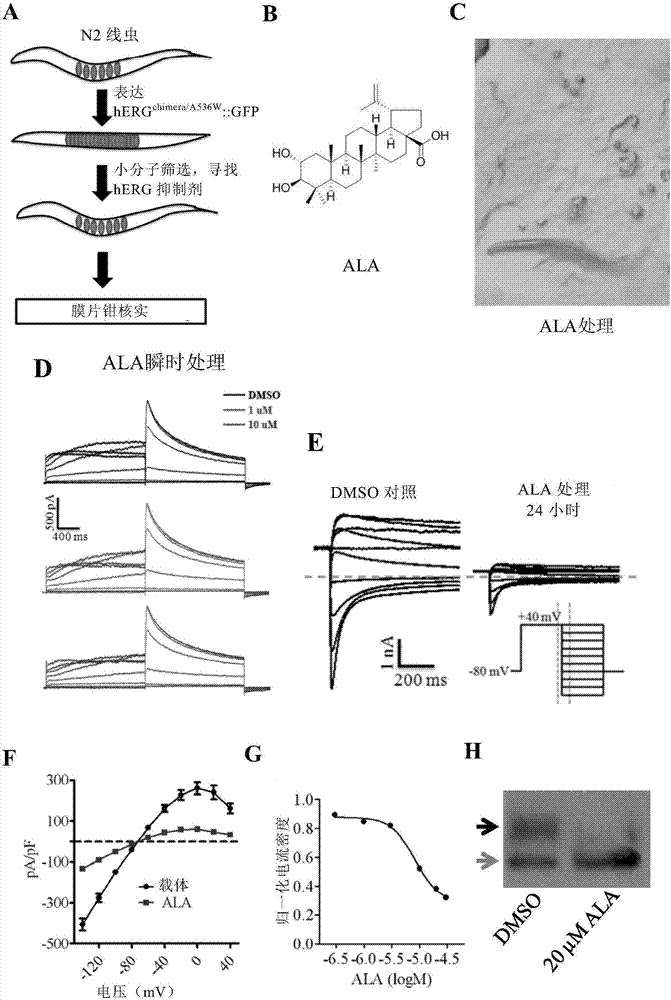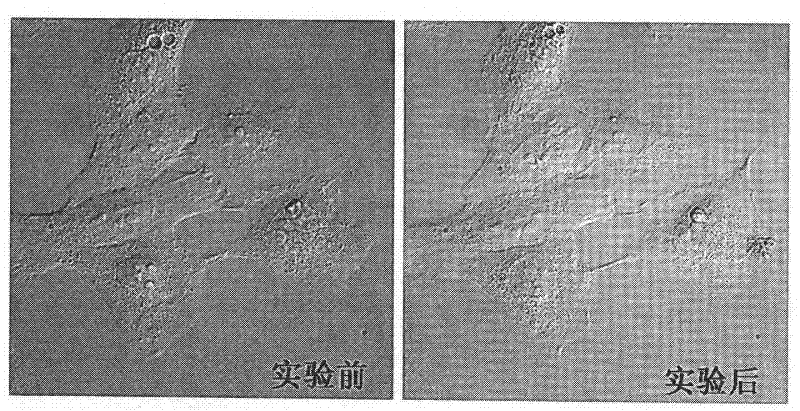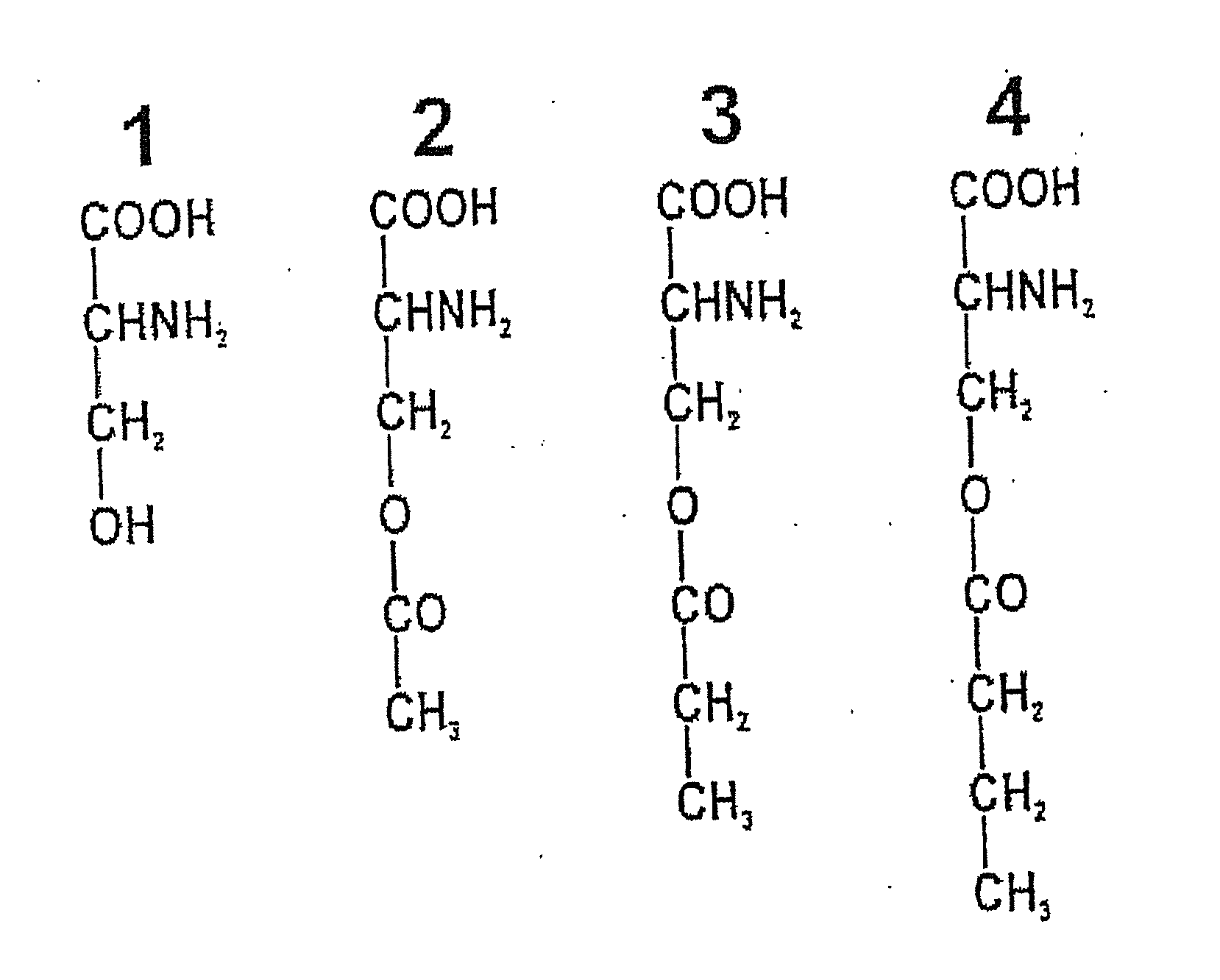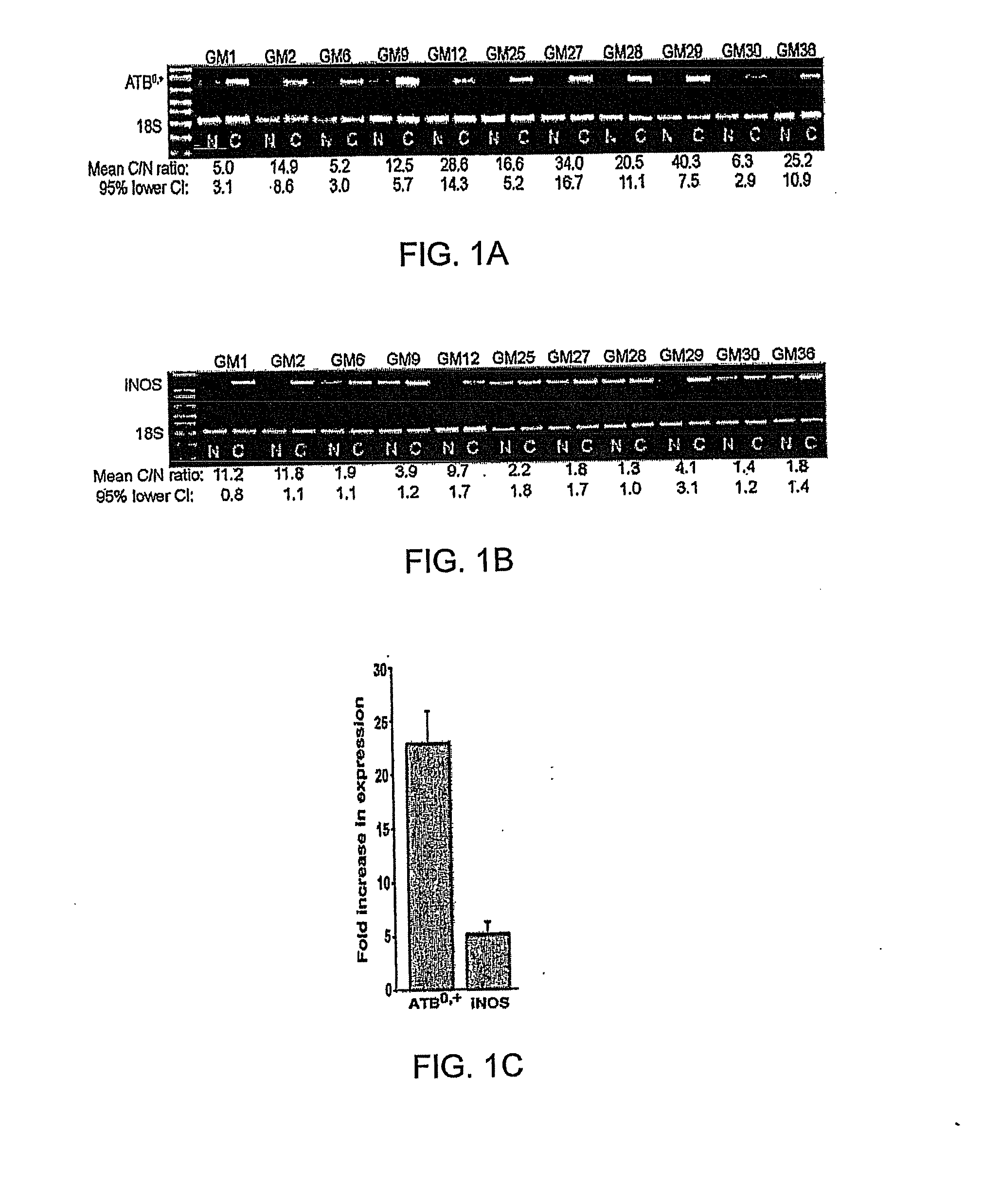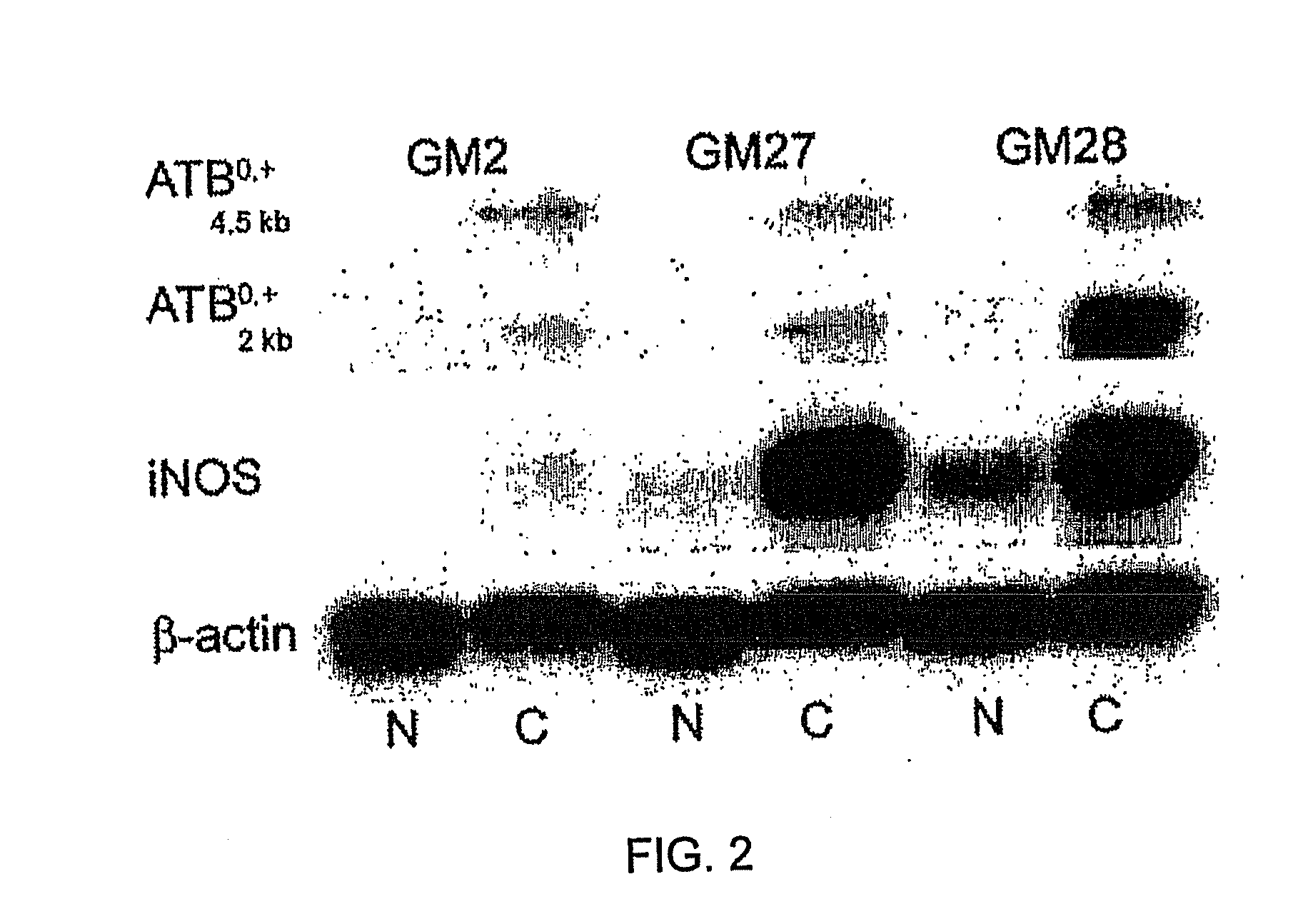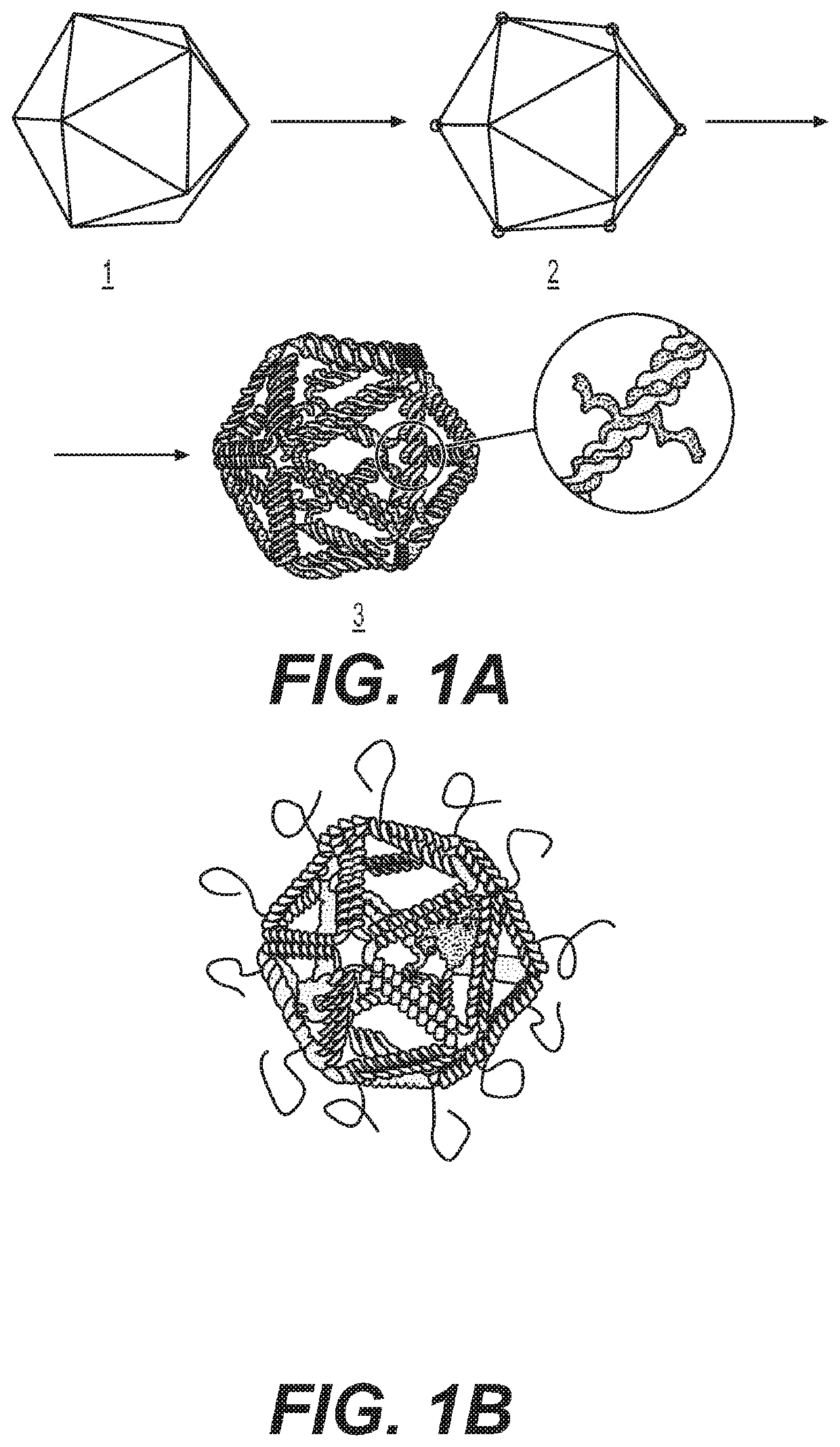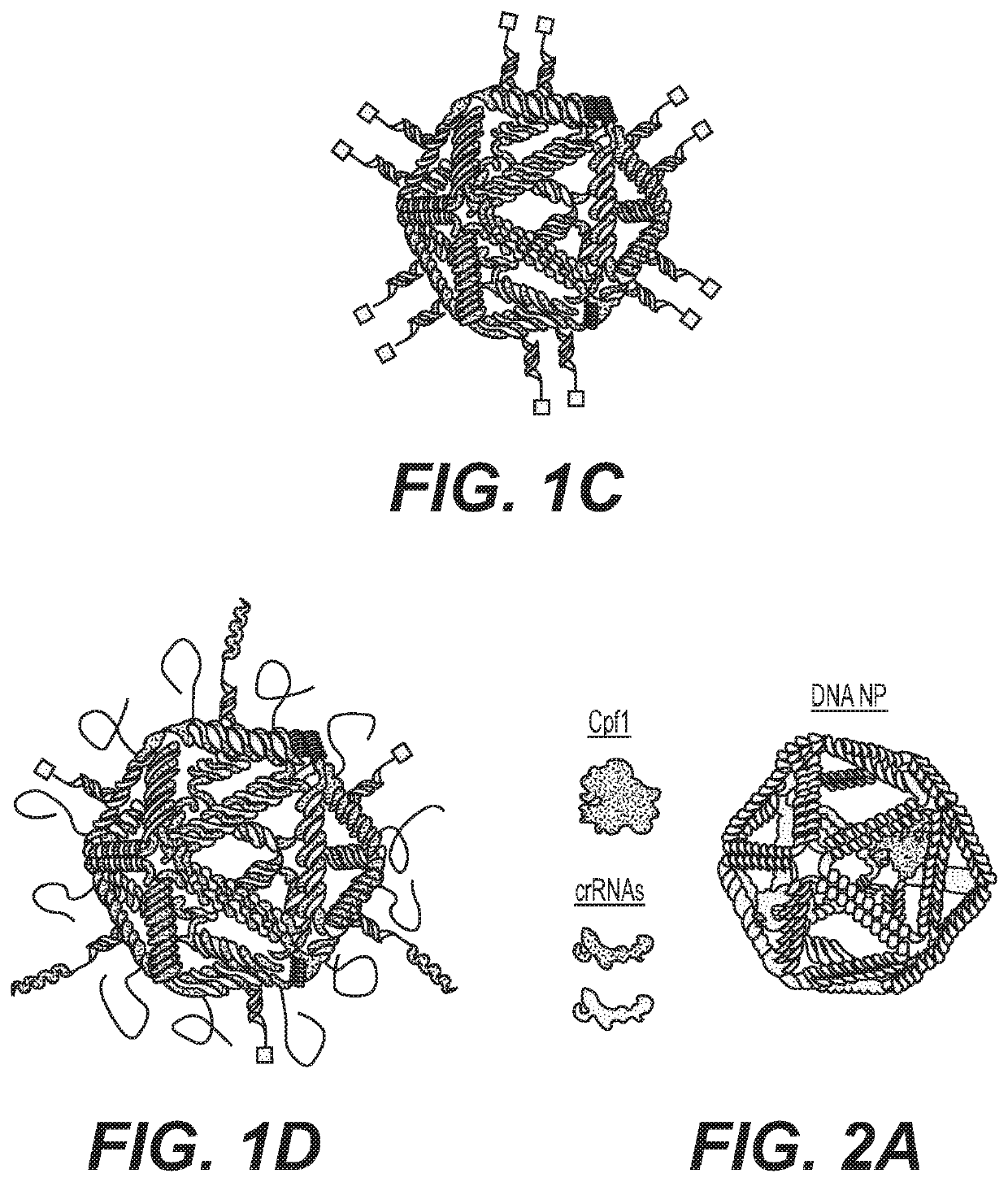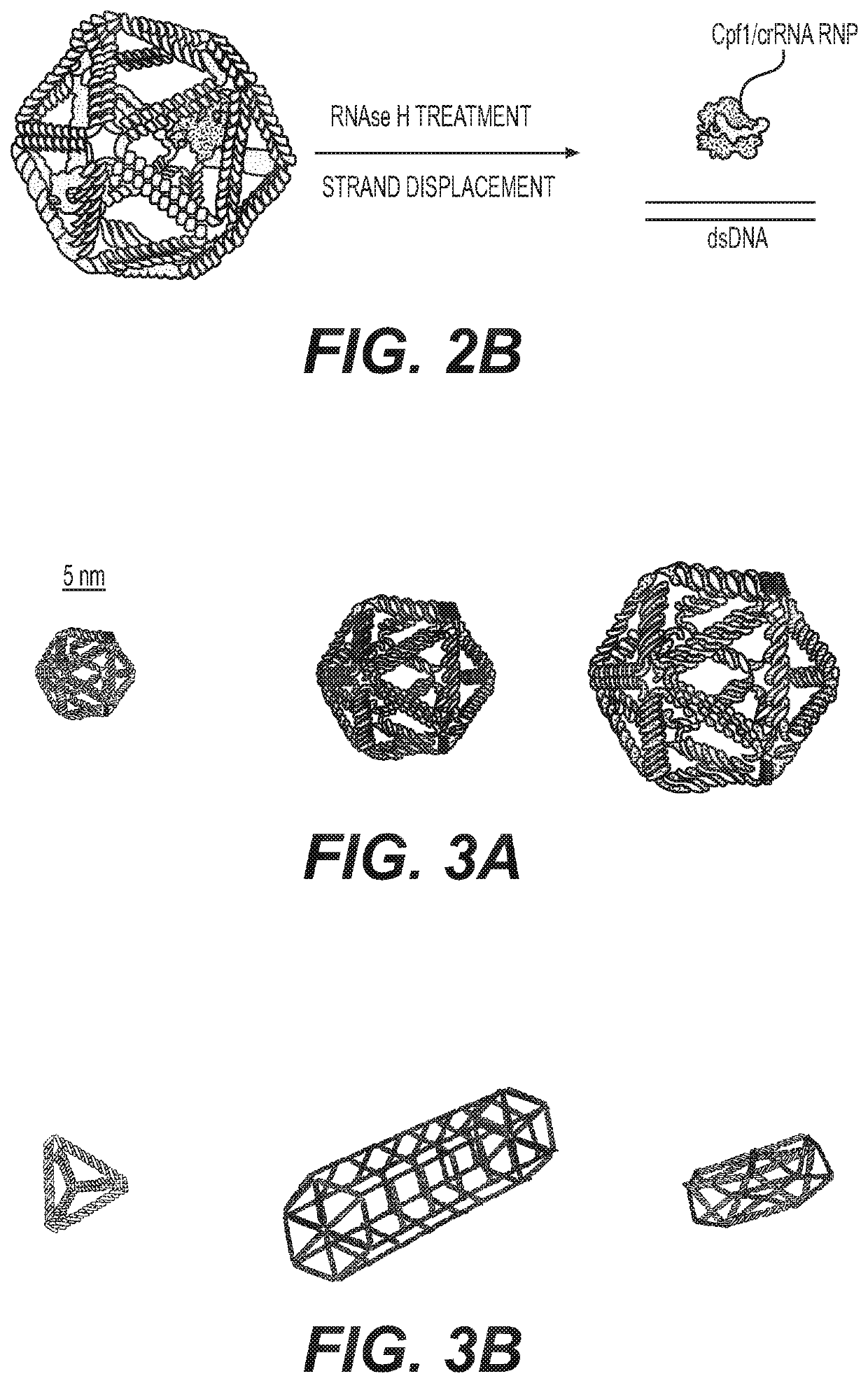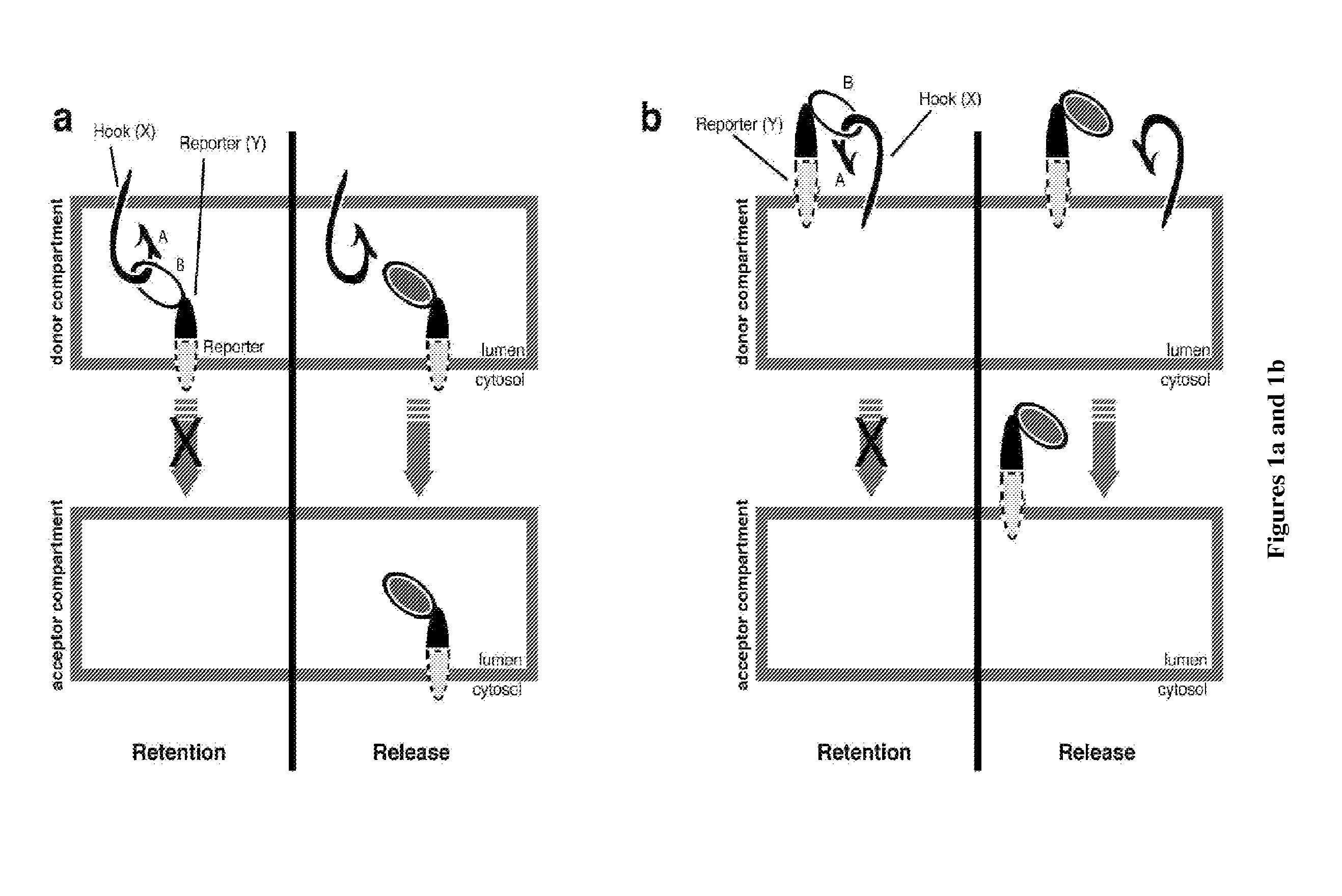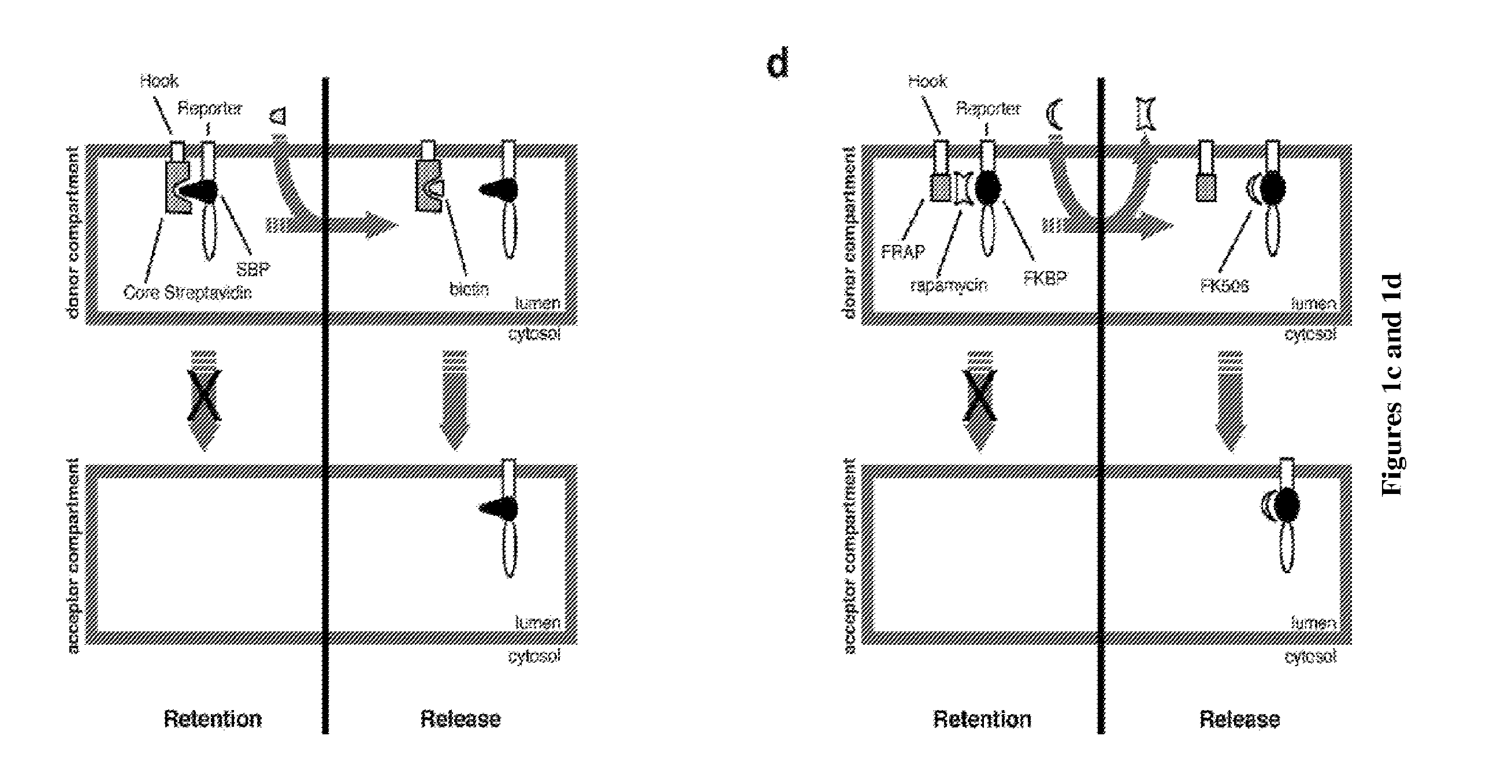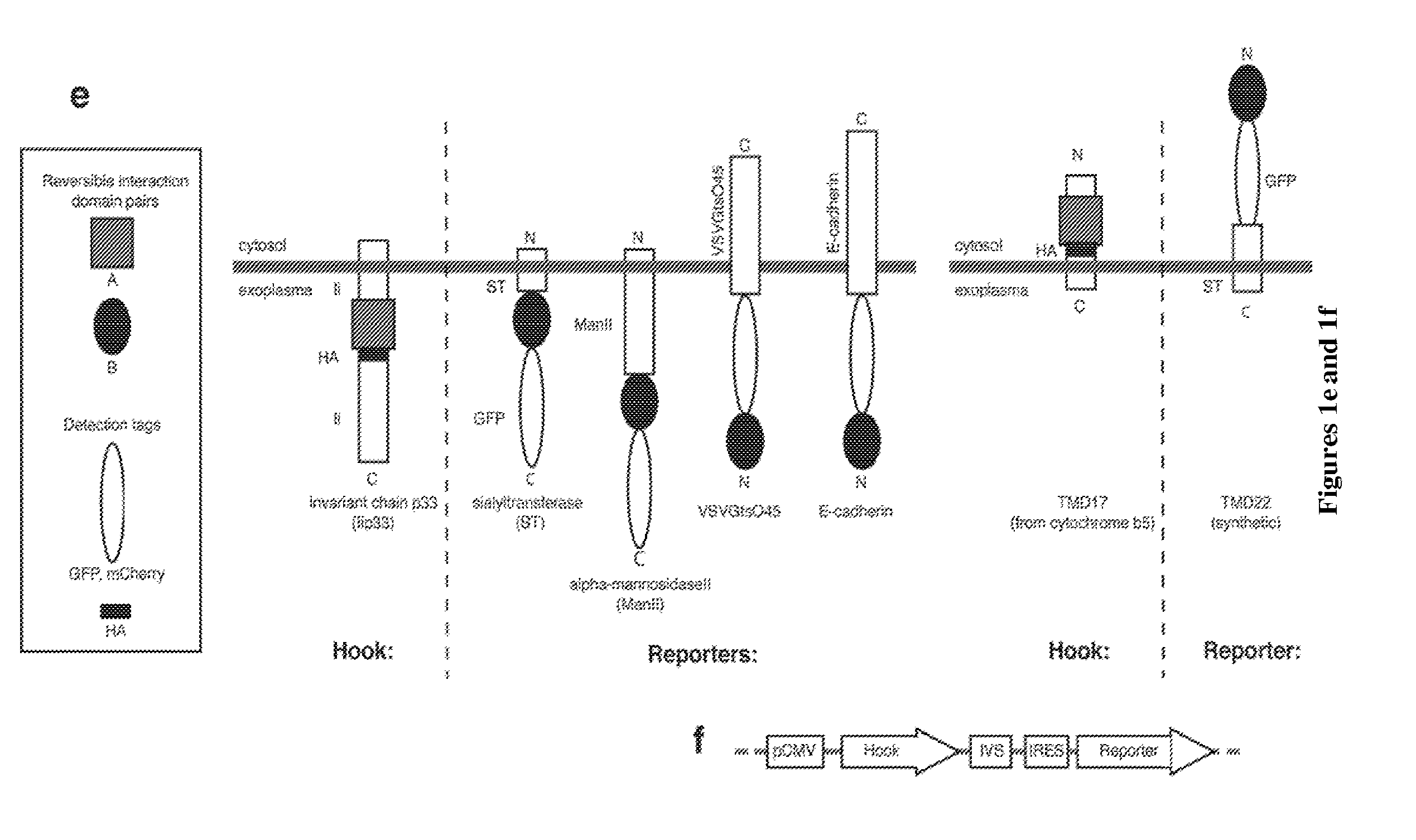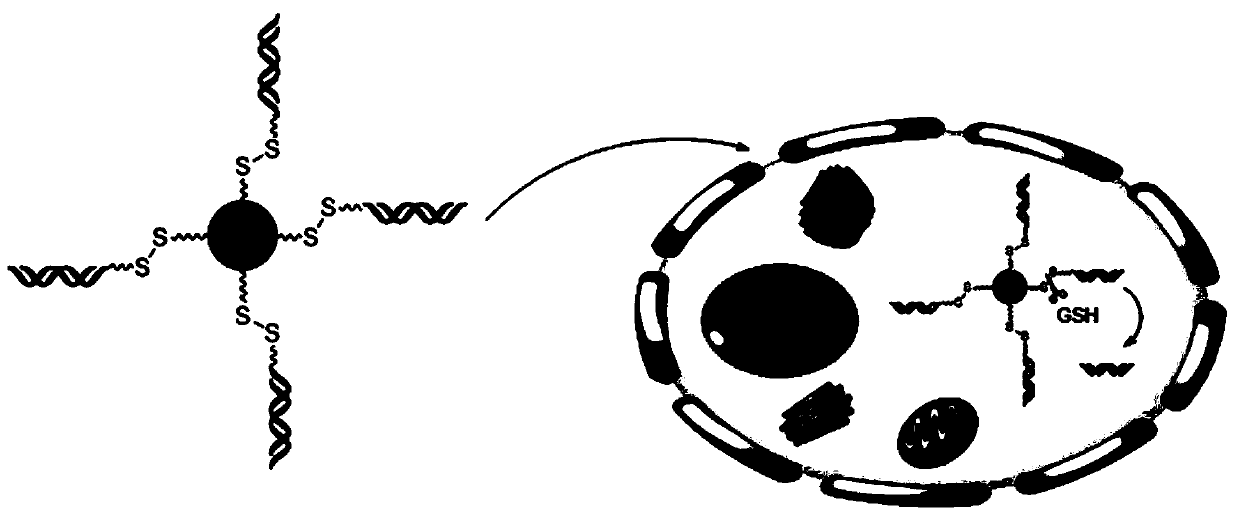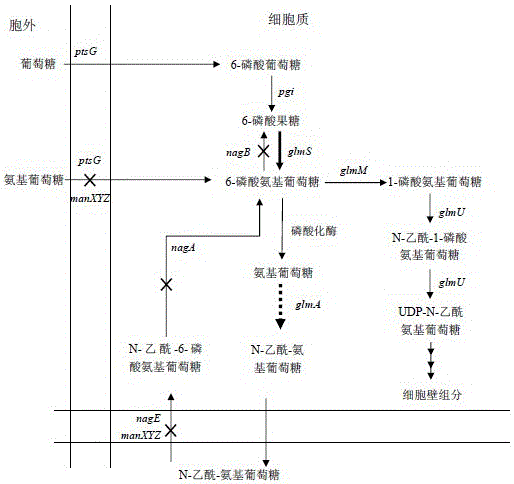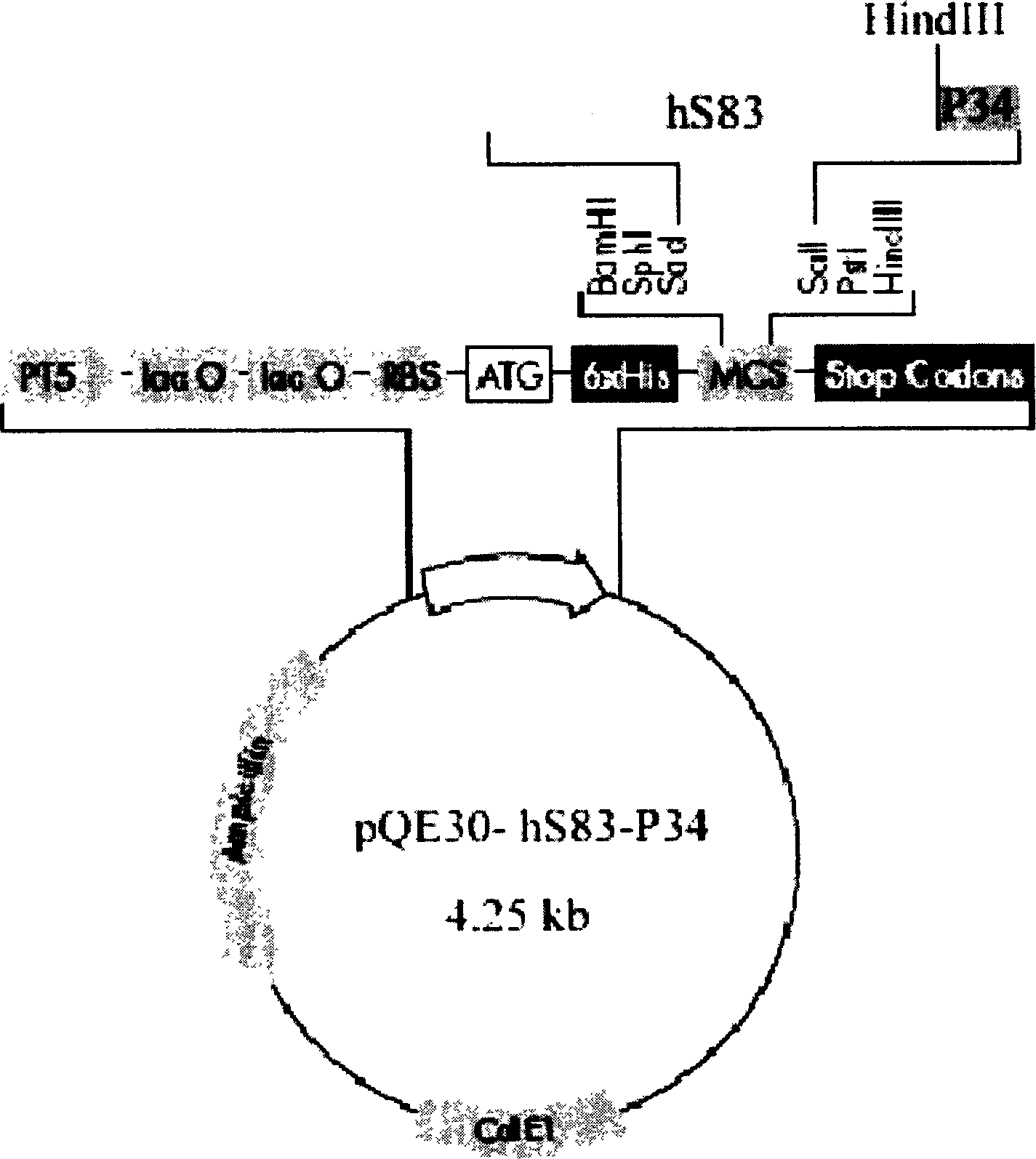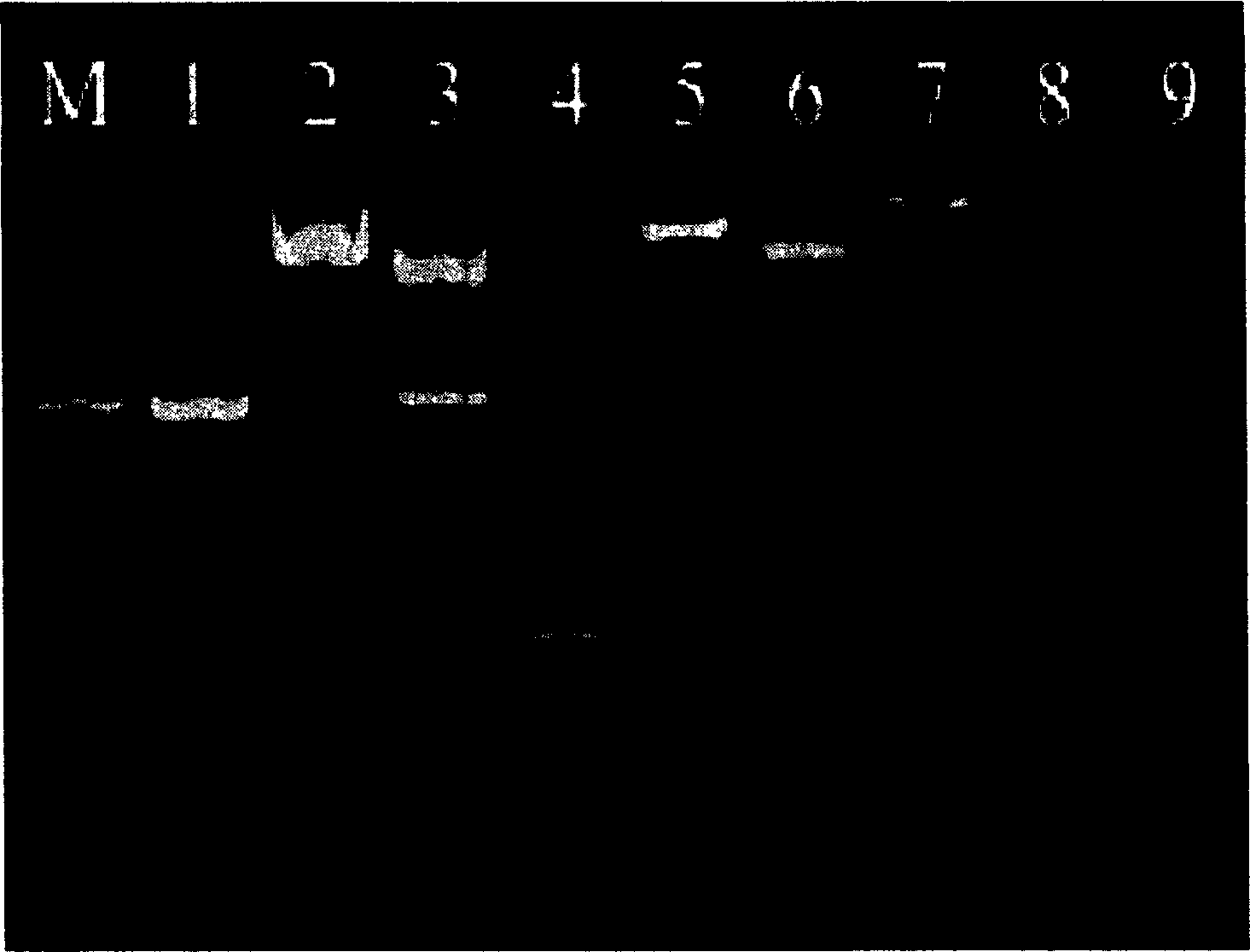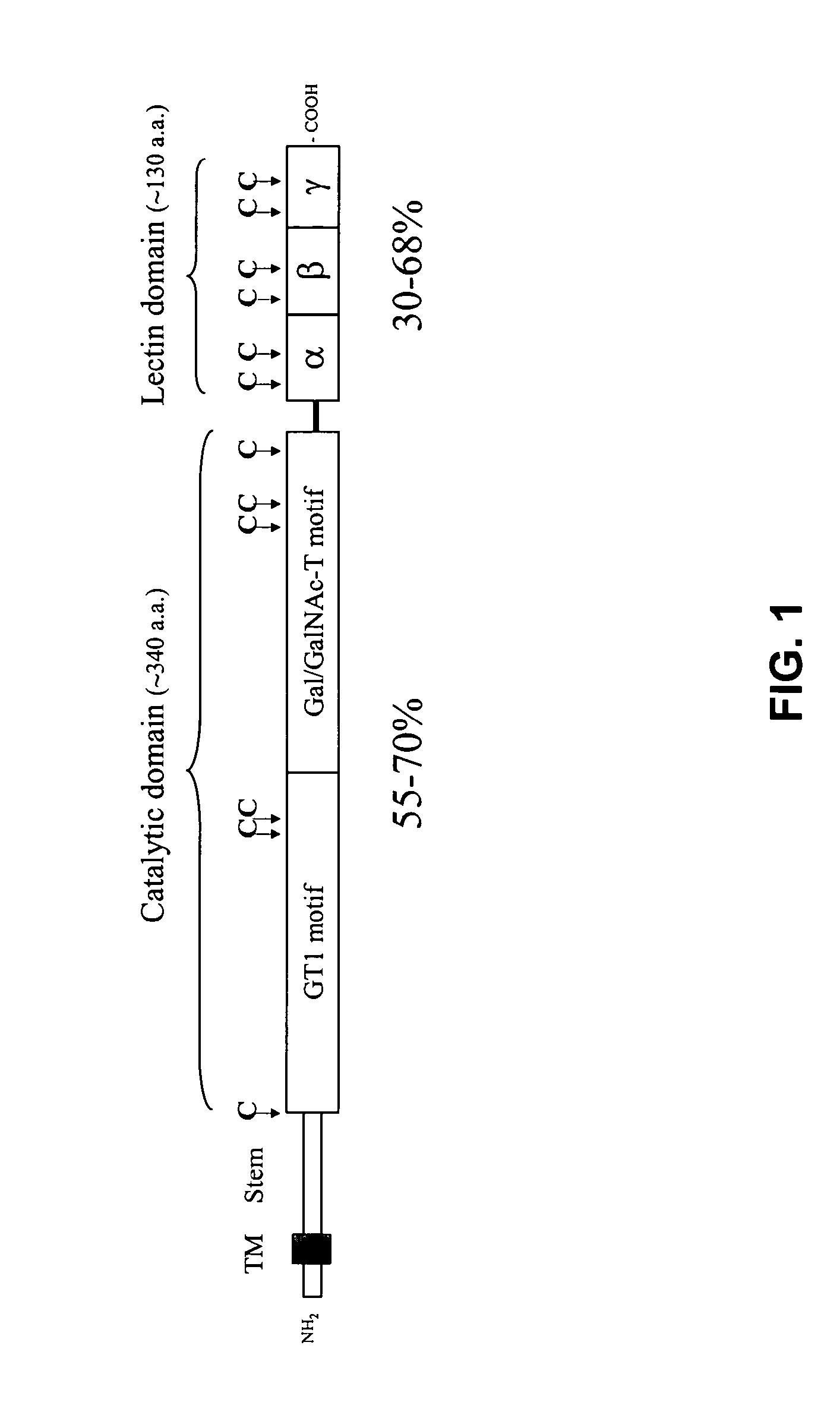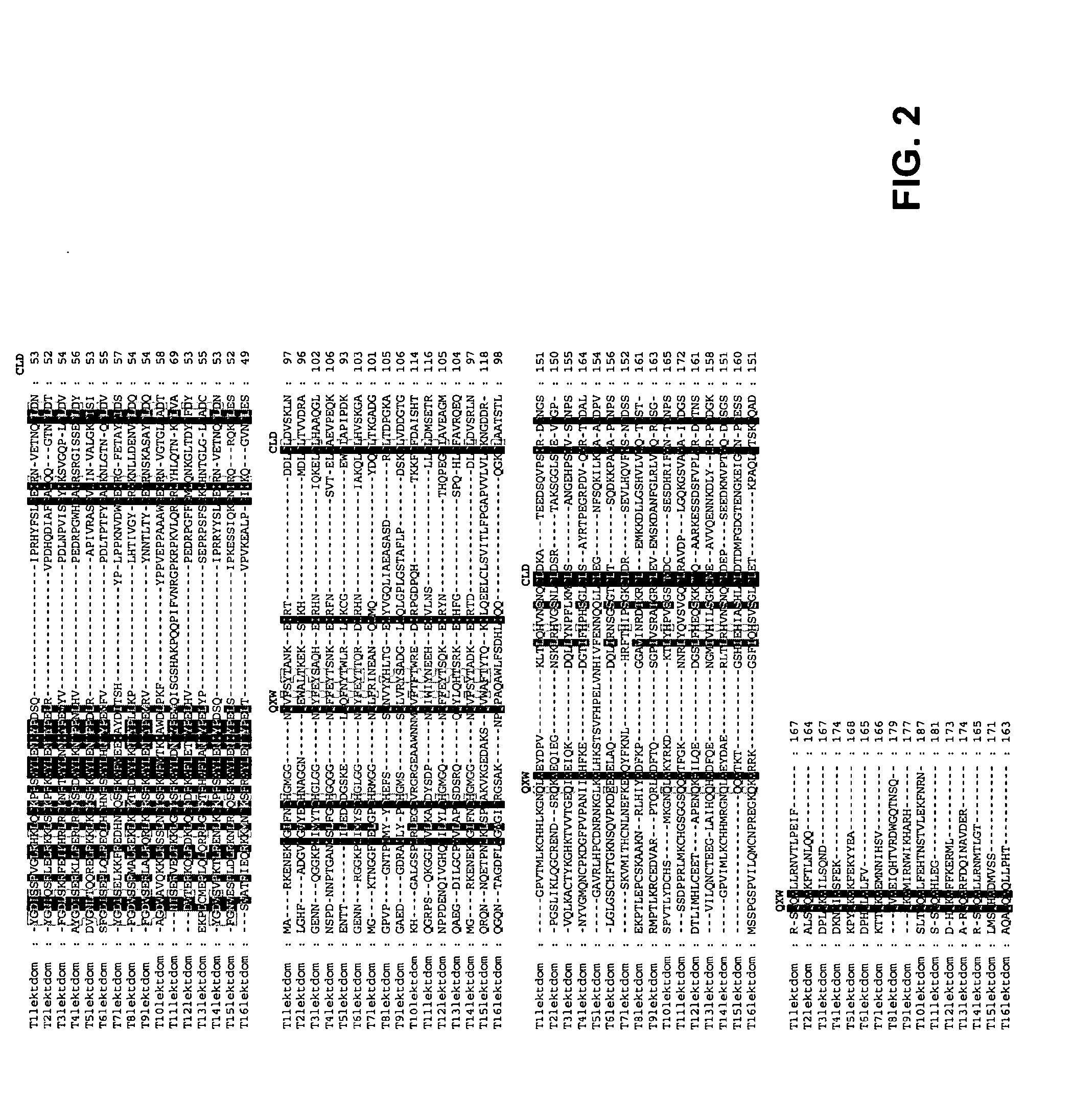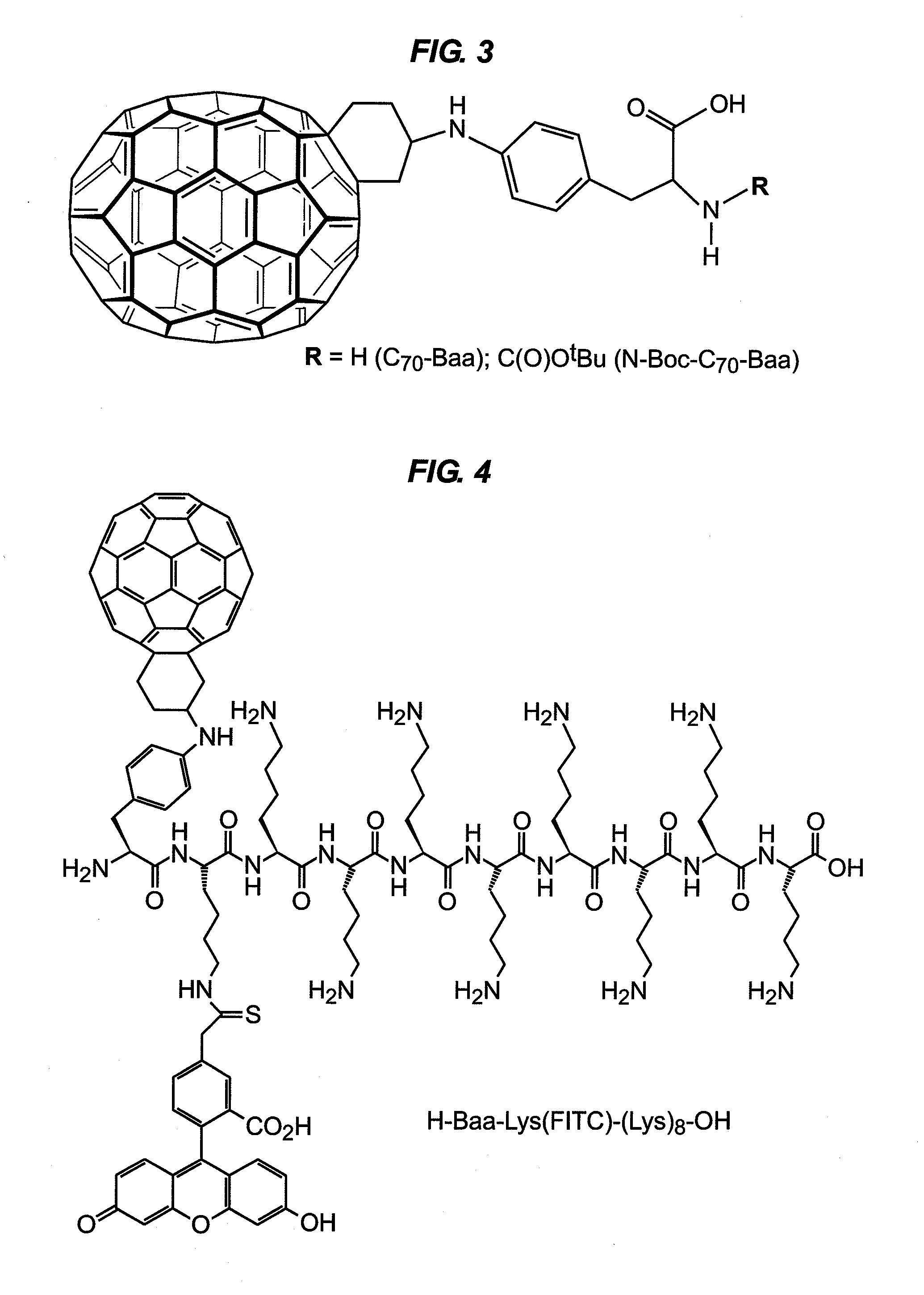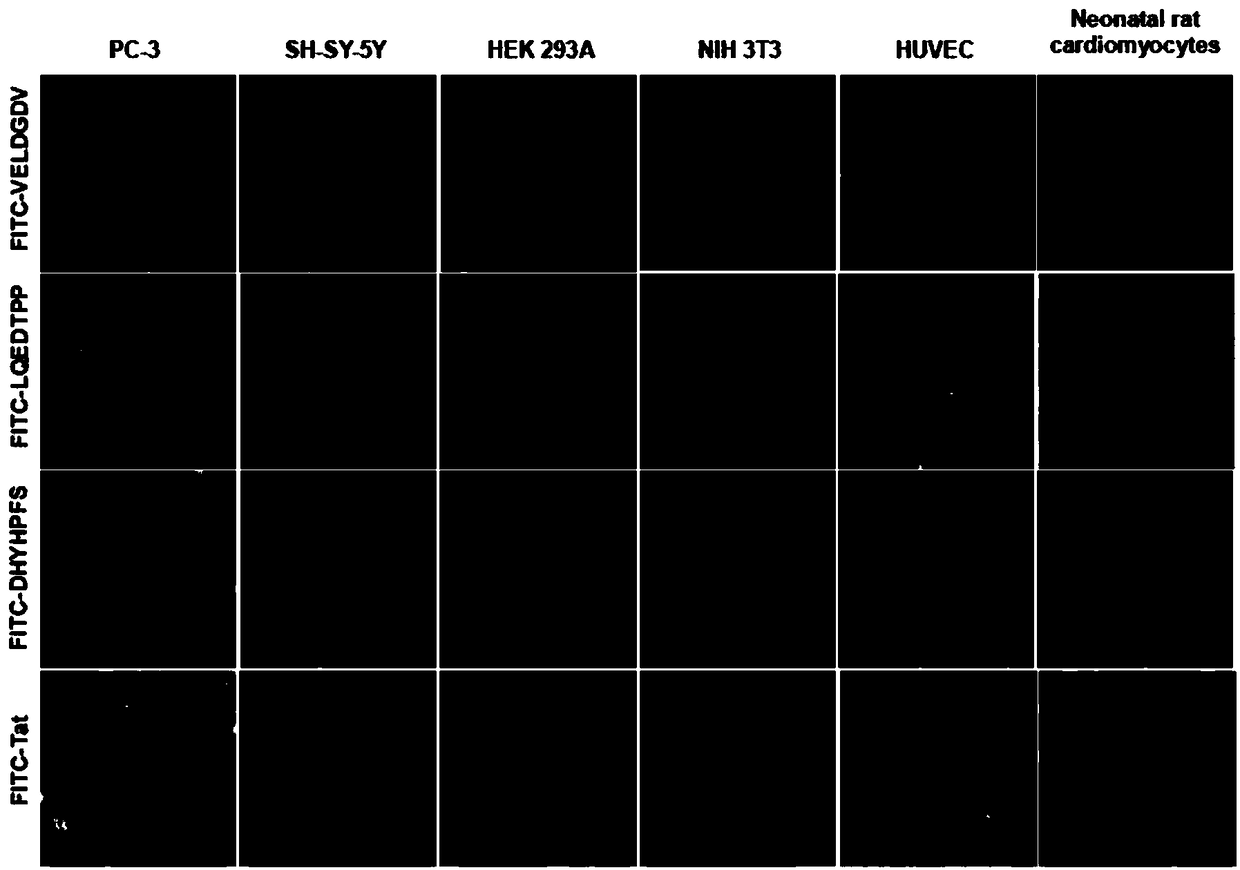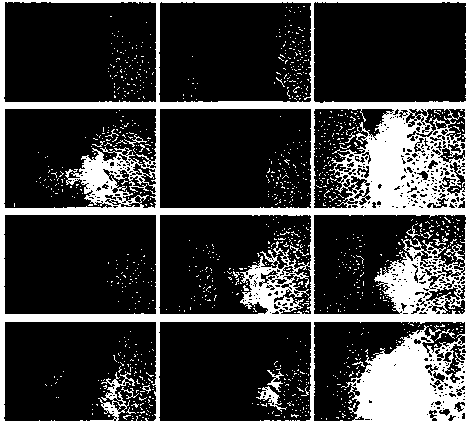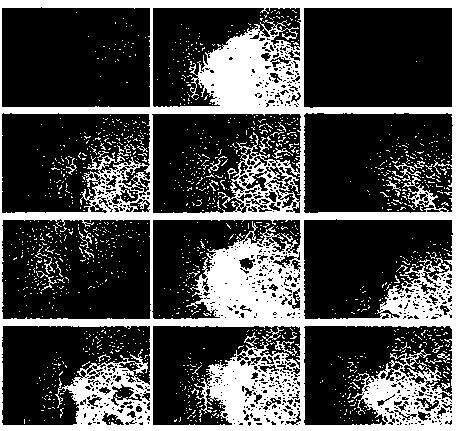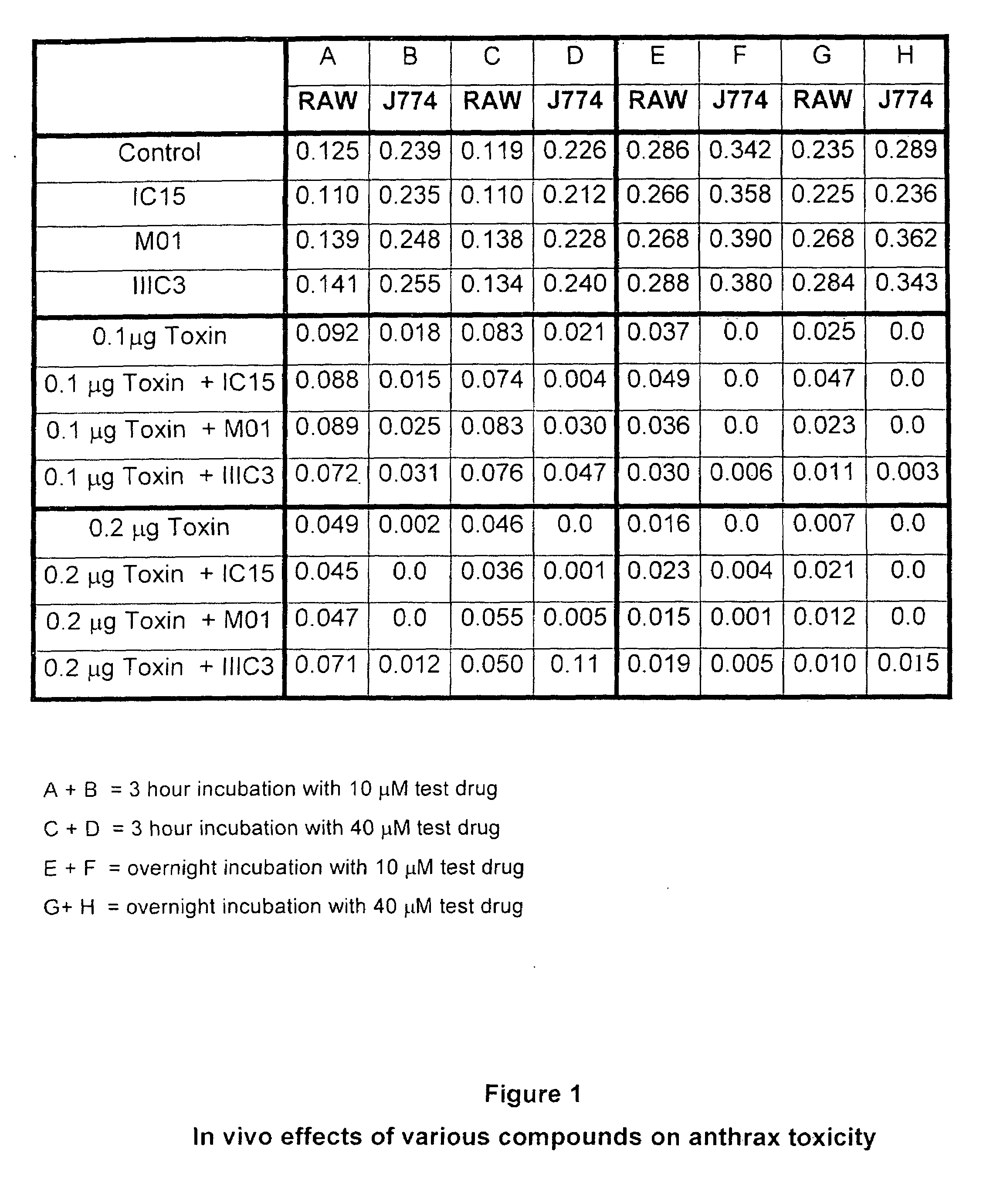Patents
Literature
Hiro is an intelligent assistant for R&D personnel, combined with Patent DNA, to facilitate innovative research.
69 results about "Intracellular transport" patented technology
Efficacy Topic
Property
Owner
Technical Advancement
Application Domain
Technology Topic
Technology Field Word
Patent Country/Region
Patent Type
Patent Status
Application Year
Inventor
Intracellular transport is the movement of vesicles and substances within the cell. Eukaryotic cells transport packets of components (membrane‐bound vesicles and organelles, protein rafts, mRNA, chromosomes) to particular intracellular locations by attaching them to molecular motors that haul them along microtubules and actin filaments. This method of transport is often confused with intercellular transport, which deals solely with the movement of cargo between cells not the net movement within a cell. Since intracellular transport heavily relies on microtubules for movement, the components of the cytoskeleton play a vital role in trafficking vesicles between organelles and the plasma membrane.
Selective cellular targeting: multifunctional delivery vehicles, multifunctional prodrugs, use as antineoplastic drugs
InactiveUS20030138432A1Improve targeting selectivityHigh affinityNanomedicineAntibody ingredientsDelivery vehicleTherapeutic intent
The present invention relates to the compositions, methods, and applications of a novel approach to selective cellular targeting. The purpose of this invention is to enable the selective delivery and / or selective activation of effector molecules to target cells for diagnostic or therapeutic purposes. The present invention relates to multi-functional prodrugs or targeting vehicles wherein each functionality is capable of enhancing targeting selectivity, affinity, intracellular transport, activation or detoxification. The present invention also relates to ultra-low dose, multiple target, multiple drug chemotherapy and targeted immunotherapy for cancer treatment.
Owner:DRUG INNOVATION & DESIGN
System and method for transdermal delivery
InactiveUS20060036209A1Improve transdermal deliveryReduce deliveryElectrotherapyMicroneedlesElectricityActive agent
A system and method for transdermally delivering a biologically active agent comprising one or more electrodes having stratum corneum-piercing projections and a circuit that delivers an electrical signal to the electrodes to electroporate a cell membrane. Preferably, the system is configured to generate homogeneous electrical fields and, more preferably, to generate spherically or semispherically symmetrical electric fields. Methods of the invention include applying a first electric signal to facilitate transdermal transport of the agent and applying a second electric signal to facilitate intracellular transport of the agent.
Owner:ALZA CORP
Methods to identify agents modulating functions of polypeptide galnac-transferases, pharmaceutical compositions comprising such agents and the use of such agents for preparing medicaments
Novel methods for identification of inhibitors or modulators of binding activities mediated by lectin domains of polypeptide GalNAc-transferases are disclosed. Direct binding activity of GalNAc-transferase lectins has been demonstrated for the first time and methods to measure lectin mediated binding of isolated lectins or enzymes with lectin domains are disclosed. The present invention specifically discloses a novel selective inhibitor of polypeptide GalNAc-transferase lectin domains, which provides a major advancement in that this inhibitor and related inhibitors sharing common characteristics of activity bind lectin domains without serving as acceptor substrate for glycosyltransferases involved in synthesis of O-glycans. This inhibitor is represented by the β-anomeric configuration of GalNAc-benzyl, GalNAcβ-benzyl. Methods for inhibiting intracellular transport, cell surface expression, and secretion of mucins and O-glycosylated glycoproteins without affecting O-glycosylation processing are disclosed using the novel selective inhibitor identified.
Owner:GLYCOZYM
Systems and methods for cell preservation
The present invention generally relates to devices and methods for the preservation of cells using drying, freezing, and other related techniques. In one set of embodiments, the invention allows for the preservation of cells in a dried state. In another set of embodiments, the invention allows for the preservation of cells within a glass or other non-viscous, non-frozen media. In some embodiments, the invention allows for the preservation of cells at temperatures below the freezing point of water, and in some cases at cryogenic temperatures, without inducing ice formation. The cells, in certain embodiments, may be preserved in the presence of intracellular and / or extracellular carbohydrates (which may be the same or different), for example, trehalose and sucrose. Carbohydrates may be transported intracellularly by any suitable technique, for example, using microinjection, or through non-microinjected methods such as through pore-forming proteins, electroporation, heat shock, etc. In certain instances, the glass transition temperature of the cells may be raised, e.g., by transporting a carbohydrate intracellularly. In some cases, the cells may be dried and / or stored, for example, in a substantially moisture-saturated environment or a desiccating environment. The cells may also be stored in a vacuum or a partial vacuum. The cells may be protected from oxygen, moisture, and / or light during storage. In certain cases, an inhibitor, such as a cell death inhibitor, a protease inhibitor, an apoptosis inhibitor, and / or an oxidative stress inhibitor may be used during preservation of the cells. The cells may be stored for any length of time, then recovered to a viable state, e.g., through rehydration, for further use.
Owner:THE GENERAL HOSPITAL CORP
System and method for transdermal delivery
A system and method for transdermally delivering a biologically active agent comprising one or more electrodes having stratum corneum-piercing projections and a circuit that delivers an electrical signal to the electrodes to electroporate a cell membrane. Preferably, the system is configured to generate homogeneous electrical fields and, more preferably, to generate spherically or semispherically symmetrical electric fields. Methods of the invention include applying a first electric signal to facilitate transdermal transport of the agent and applying a second electric signal to facilitate intracellular transport of the agent.
Owner:ALZA CORP
Preparation method and application of carbon nanomaterial-immunostimulatory sequence compound
ActiveCN103212089AEasy to prepareLow costOrganic active ingredientsGenetic material ingredientsModified carbonImmunocompetence
The invention discloses a preparation method and application of a carbon nanomaterial-immunostimulatory sequence compound. The preparation method comprises the steps of (1) modifying a carbon nanomaterial through polylysine to obtain a polylysine-modified carbon nanomaterial; and (2) mixing the polylysine-modified carbon nanomaterial obtained from the step (1) with an immunostimulatory sequence in a water solution, oscillating for 0.5-3 hours at 20-37 DEG C, and centrifuging, collecting and depositing to obtain the carbon nanomaterial-immunostimulatory sequence compound. According to the carbon nanomaterial-immunostimulatory sequence compound, the carbon nanomaterial serves as a carrier for intracellular transport of the immunostimulatory sequence (CpG DNA), so as to remarkably improve the cellular uptake efficiency of the CpG DNA, protect the CpG DNA from being degraded by nuclease and enhance the immunocompetence of an organism for a long time, so the carbon nanomaterial-immunostimulatory sequence compound has a good medical application prospect.
Owner:SHANGHAI INST OF APPLIED PHYSICS - CHINESE ACAD OF SCI
Construction and application methods of escherichia coli with high yield of producing N-acetylglucosamine
InactiveCN104498517AHigh expressionBlock consumptionMicroorganism based processesFermentationEscherichia coliGlycerol
The invention discloses construction and application methods of escherichia coli with a high yield of producing N-acetylglucosamine, and belongs to the technical field of genetic engineering. According to the construction and application methods disclosed by the invention, the decomposition and the intracellular transport pathways of N-acetylglucosamine and the by-products thereof are blocked by modifying and transforming the existing metabolic pathway of escherichia coli, meanwhile, an exogenous glucosamine acetylase gene is introduced, a complete synthesis pathway from glucose to N-acetylglucosamine is formed in a host, the constructed engineering strain is capable of utilizing glucose or glycerol as a substrate for synthesising N-acetylglucosamine through aerobic fermentation culture, so as to realize industrialized production.
Owner:BINZHOU JINLANG BIOTECH
Prodrugs of Short-Chain Fatty Acids and Treatment Methods
InactiveUS20090123388A1Reducing the dosage of these toxic chemicalsHarm reductionBiocideSugar derivativesLymphatic SpreadUlcerative colitis
Prodrugs made up of biologically-active short-chain fatty acids or derivatives thereof conjugated to neutral or cationic amino acids capable of intracellular transport by ATB0,+ are provided. The short-chain fatty acid or derivative thereof can be attached to the amino acid through a hydroxyl group of the amino acid to form a fatty acid ester of the amino acid, or it can be attached through the amino group of the amino acid to form a fatty-acid amide of the amino acid. Serine butyrate (O-butyryl serine) is a preferred prodrug. These prodrugs are useful for treatment of colon cancer, inflammatory bowel disease, ulcerative colitis, Crohn's disease, lung cancer, cervical cancer, and cancers resulting from metastases from primary colon cancer sites. Methods of delivering biologically-active short-chain fatty acids or derivatives thereof to cells in need of these molecules and methods of treating diseases using the prodrugs of this invention are also provided.
Owner:MEDICAL COLLEGE OF GEORGIA RES INST
Modular antigen transporter molecules (MAT molecules) for modulating immune reactions, associated constructs, methods and uses
ActiveCN1738901AEffective specific immune responseEffective immune responseAntibody mimetics/scaffoldsAntipyreticAntigenAntigen processing
By adding the novel developed modular antigen transporter molecules (MAT molecules) and other instruments related thereto, the immune system of an individual can be effectively modulated in a targeted manner. The MAT molecules contain a translocation module which transports the MAT molecule inside the cell, an active intracellular targeting molecule resulting in intracellular transport of the MAT molecule to the organelles of the cell which are responsible for antigen processing and an antigen module which determines the specificity of the immune response modulated by the MAT molecule. Optionally, other modules such as tag modules or spacer modules can be contained in the MAT molecule. The invention comprises the inventive MAT molecules, antibodies which are produced using said MAT molecules and therapeutic agents and diagnostic reagents which are produced with MAT molecules. The invention also comprises applications containing said MAT molecules, antibodies, therapeutic agents and diagnostic reagents.
Owner:BOEHRINGER LNGELHEIM VETMEDICA GMBH
[12] aneN3 cationic lipid containing targeted group and fluorescent group, transgenic vector, and preparation methods of cationic lipid and transgenic vector
ActiveCN105541799AImprove targetingImprove monitoring tracking performanceOrganic chemistryGenetic material ingredientsCholic acidFluorescence
The invention provides a [12] aneN3 cationic lipid containing a targeted group and a fluorescent group and a transgenic vector containing the same. The invention also discloses preparation methods of the cationic lipid and the transgenic vector. The cationic lipid provided by the invention contains the targeted group cholic acid and the fluorescent group naphthalimide simultaneously; the transgenic vector formed by the cationic lipid has lower cytotoxicity, has a certain targeting property on hepatoma cells, not only can monitor intracellular transport and release of vector / DNA complexes in a same cell but also has a certain selectivity on the hepatoma cells to promote the development of gene therapy, and also has higher transfection efficiency; the preparation methods of the cationic lipid and the transgenic vector are simple, mature, and easy to control.
Owner:BEIJING NORMAL UNIVERSITY
Composition for regulating sub-health status of crowd suffering from lipodystrophy
ActiveCN104643073AInhibit synthesisTo promote metabolismNatural extract food ingredientsFood ingredient functionsMetabolitePhosphorylation
The invention discloses a composition for regulating the sub-health status of the crowd suffering from lipodystrophy. The composition mainly has the effects of reducing the expression of the hypothalamic neuropeptide gamma by influencing human leptin, improving the energy metabolism efficiency, increasing the energy consumption and inhibiting fat synthesis. The other components with fat decomposing effects are combined, so that the metabolism of human adipose tissues is promoted, and the intracellular oxidative phosphorylation effect and synthesis of cell endogenous cholesterol are inhibited. The composition can be used for achieving the effects of effectively infiltrating into the human skin, inhibiting the activity of lipase and reducing the synthesis of fat. By combining the traditional Chinese medicine naprapathy, the absorption and intracellular transport of the composition can be further promoted, the metabolism is promoted, the triglyceride in the fat is decomposed, the excretion of steroid and gallic acid is increased, the excretion of cholesterol and other metabolites can be accelerated, a local shaping effect is achieved, and the contents of glycerin and cholesterol in serum are reduced in an assisted mode. The pharmacological action of the cardiovascular system is improved, and the blood circulation is improved.
Owner:SHENZHEN GENE BIOLOGICAL TECH
Nanostraw well insert devices for improved cell transfection and viability
ActiveUS20190367861A1Easy to integrateHigh transfection efficiencyBioreactor/fermenter combinationsAnodisationSurvivabilityElectroporation
Described herein are nanostraw well insert apparatuses (e.g., devices and systems) that include nanotubes extending through and out of a membrane so that a material can pass through the membrane from a fluid reservoir depot and into a cell grown onto the nanotubes when electrical energy (e.g., electroporation energy) is applied. In particular, the device, systems and methods described herein may be adapted for cell growth viability and transfection efficiency (e.g., >70%). These apparatuses may be readily integratable into cell culturing processes for improved transfection efficiency, intracellular transport, and cell viability.
Owner:THE BOARD OF TRUSTEES OF THE LELAND STANFORD JUNIOR UNIV
Modular antigen transporter molecules (MAT molecules) for modulating immune reactions, associated constructs, methods and uses
By adding the novel developed modular antigen transporter molecules (MAT molecules) and other instruments related thereto, the immune system of an individual can be effectively modulated in a targetedmanner. The MAT molecules contain a translocation module which transports the MAT molecule inside the cell, an active intracellular targeting molecule resulting in intracellular transport of the MATmolecule to the organelles of the cell which are responsible for antigen processing and an antigen module which determines the specificity of the immune response modulated by the MAT molecule. Optionally, other modules such as tag modules or spacer modules can be contained in the MAT molecule. The invention comprises the inventive MAT molecules, antibodies which are produced using said MAT molecules and therapeutic agents and diagnostic reagents which are produced with MAT molecules. The invention also comprises applications containing said MAT molecules, antibodies, therapeutic agents and diagnostic reagents.
Owner:BOEHRINGER LNGELHEIM VETMEDICA GMBH
Preparation method for degradable white cardboard applied to food packaging
InactiveCN108193562AImprove bending resistanceImprove surface strengthWrappersReinforcing agents additionFiberCardboard
The invention specifically relates to a preparation method for a degradable white cardboard applied to food packaging, belonging to the technical field of papermaking. According to the invention, a self-made mixed base material, the self-made disperse starch material and lactic acid bacteria are subjected to mixed fermentation, and a fermentation product is centrifuged to obtain a viscous precipitate; the viscous precipitate and homemade ura sedge fibers are subjected to mixing and papermaking to obtain a top paper layer; shell powder is sprayed onto the top paper layer, and then calendering is carried out to obtain the degradable white cardboard; the used ura sedge fibers can act on the cell walls and the plasmalemmas of bacteria to prevent nutrients from being transported into cells; polylactic acid contained in the white cardboard has antibacterial and mildew-resistant functions, so the white cardboard has excellent antibacterial properties; polylactic acid also has the characteristics of softness and toughness, so the bending resistance of white cardboard can be improved; and a polylactic acid main chain in the white cardboard contains easily-hydrolyzable ester bonds, and polylactic acid belongs to polyester polymer materials, so the white cardboard has good degradation performance, is of great significance in environmental protection, and shows good application prospects.
Owner:NOTTING CHANGZHOU PRECISION MACHINERY
Fluorescent cytotoxic compounds specific for the cellular polyamine transport system
InactiveUS20130337494A1Easy to trackPhotophysical propertyOrganic chemistryMicrobiological testing/measurementCompound specificFluorescence
Cyano-substituted anthracene containing polyamines were synthesized and shown to be efficient polyamine transporter ligands. Moreover, these compounds (3 and 4) had improved fluorescence properties over previously known anthryl-polyamine conjugates, which facilitated their intracellular trafficking by confocal microscopy and fluorescence methods. These cytotoxic fluorescent agents may find use as molecular probes which traffic into cells via the polyamine transport system and may also be viable anticancer drugs which are readily quantified in human tissues due to their excellent fluorescence properties: (excitation: λ405 nm) and emission (420 nm) occurs in the visible light range. The ability to excite and emit in the visible range provides an advantage to these probes as these wavelengths are considered non-toxic to human cells (versus ultraviolet mediated excitations, λ<400 nm) and visible light lasers are less costly to purchase and operate than UV laser sources.
Owner:UNIV OF CENT FLORIDA RES FOUND INC
Preparation method of antibacterial wet tissue
InactiveCN107714550APromote growthStop shippingCosmetic preparationsToilet preparationsCuticleUrsolic acid
The invention discloses a preparation method of an antibacterial wet tissue and belongs to the technical field of wet tissues. The preparation method is characterized in that pomegranate bark is utilized for culture and ferment in a culture medium, is a natural plant antibacterial substance simultaneously and contains the main components of granatin, ursolic acid, isoquercitrin, mannitol and malicacid which are biological active substances and play a role in inhibiting bacteria, so that a new strain with antibacterial activity is provided; cold storage is utilized to cause the strain to be dormant, and the dormant strain also has an adsorbing effect and can adsorb on the surfaces of the bacteria so as to play a role in inhibiting and killing bacteria; simultaneously, a layer of degradablehigh-molecular substance is laid on the surface of a base material, so that a layer of high-molecular membrane can be formed to prevent nutritional substances from transporting into cells; simultaneously, due to the degradable high-molecular substance, the wet tissue can be biodegraded, so that the environmental pollution can be avoided; in addition, due to addition of a wetting agent and a skin-care agent, the antibacterial wet tissue can be better attached with the skin and can prevent the epidermis of the skin from being injured.
Owner:周荣
Method for screening hERG potassium ion channel agonist and detecting toxicity
ActiveCN107011444APolypeptide with localisation/targeting motifBiological testingCyclic nucleotide bindingScreening method
The invention relates to a method for screening hERG potassium ion channel agonist and detecting toxicity. Particularly, the invention firstly relates to a fusion protein, which contains a fragment (which is used as the N end of the fusion protein, is from a position between 1st to 85th amino acid residues of the N end of the nemathelminth ERG family potassium ion channels UNC-103 protein and has the length of 75 to 85 amino acid residues), hERG or a fragment at least containing S1-S6 transmembrane domains and cyclic nucleotide binding domains, and a fragment (which is used as the C end of the fusion protein, is from a position between 590th to 829th of amino acid residues of the C end of the UNC-103 protein and has the length of 220 to 240 amino acid residues). The invention also relates to a polynucleotide sequence coding the fusion protein, a relevant transgenic nemathelminth, a relevant screening method and application. The inventor builds an in-vivo hERG-intracellular-transport-influence-recognizable compound molecule screening method for screening hERG inhibitors or LQTS (long QT syndrome) relevant channel mutant functional correcting agents for the first time; the novel path and method are provided for hERG toxicity detection and LQTS treatment medicine screening.
Owner:CENT FOR EXCELLENCE IN BRAIN SCI & INTELLIGENCE TECH CHINESE ACAD OF SCI
A method for studying anticancer drugs by monitoring endocytosis in real time
InactiveCN102262079AAccurate recordTo achieve horizontal comparisonMicrobiological testing/measurementFluorescence/phosphorescenceCell membraneTherapeutic effect
The invention provides a method for real-time monitoring of cell endocytosis to study anticancer drugs. The method for real-time monitoring of the endocytosis process provided by the present invention comprises the following steps: 1) adding anticancer drugs to make it act on the cells to be tested; 2) connecting epidermal growth factor on the cell membrane of the cells to be tested by a two-step labeling method -Quantum dot probe; 3) Using a fluorescence microscope to observe and photograph under the condition that the light intensity is less than 100 μW, and track the endocytosis process according to the quantum dot label; 4) Quantitatively analyze the photographed data to obtain a relative endocytosis curve. The method provided by the present invention achieves the study of drug effects by quantitatively analyzing the effect of anticancer drugs on endocytosis through real-time observation throughout the whole process, and also considers the influence of cell shape to standardize the endocytic transport data of different cells, completely It can realize horizontal comparison and provide a new quantitative research method for the research, development, screening and therapeutic effect of anticancer drugs.
Owner:INST OF PHYSICS - CHINESE ACAD OF SCI
Prodrugs of short-chain fatty acids and treatment methods
ActiveUS20110245339A1Reducing the dosage of these toxic chemicalsHarm reductionBiocideDigestive systemUlcerative colitisLung cancer
Prodrugs made up of biologically-active short-chain fatty acids or derivatives thereof conjugated to neutral or cationic amino acids capable of intracellular transport by ATB0,+ are provided. The short-chain fatty acid or derivative thereof can be attached to the amino acid through a hydroxyl group of the amino acid to form a fatty acid ester of the amino acid, or it can be attached through the amino group of the amino acid to form a fatty-acid amide of the amino acid. Serine butyrate (O-butyryl serine) is a preferred prodrug. These prodrugs are useful for treatment of colon cancer, inflammatory bowel disease, ulcerative colitis, Crohn's disease, lung cancer, cervical cancer, and cancers resulting from metastases from primary colon cancer sites. Methods of delivering biologically-active short-chain fatty acids or derivatives thereof to cells in need of these molecules and methods of treating diseases using the prodrugs of this invention are also provided.
Owner:GEORGIA HEALTH SCI UNIV RES INST
Recombinant microorganisms for producing orotic acid and method thereof
ActiveCN110564660AEnhanced metabolic fluxIncrease productionBacteriaHydrolasesOrotic acid metabolismOrotic aciduria
The invention provides a plurality of recombinant microorganisms for producing orotic acid and a method thereof. The recombinant microbial strains have one or more or all of the following characteristics: (1) the synthesis of phosphoribosyltransferase or orotic acid nucleoside monophosphate decarboxylase in an orotic acid metabolic pathway is weakened or completely lost; (2) a corresponding enzymeamount is increased through overexpression of five genes of enzymes participating in the orotic acid synthesis route; and (3) the corresponding transport protein is increased by overexpression of a transport protein coding gene for intracellular transport of orotic acid.
Owner:SUZHOU BIOSYNTHETICA CO LTD
Nucleic acid assemblies for use in targeted delivery
PendingUS20210317479A1Useful physiochemical propertyEnhance stability and half-lifeSpecial deliveryActivity regulationCell organisationIn vivo
Disclosed are compositions and methods involving nucleic acid assemblies that enclose and / or protect cargo. Disclosed are compositions that include a nucleic acid assembly comprising one or more nucleic acid molecules and cargo comprising two or more cargo molecules. The nucleic acid assembly can have physiochemical properties that: (i) enhance targeting of the composition to one or more types of cells, tissues, organs, or microenvironments relative to other types of cells, tissues, organs, or microenvironments in vivo; (ii) enhance stability and / or half-life of the composition in vivo; and / or (iii) reduce immunogenicity of the composition. The nucleic acid assembly and / or cargo can have features that enhance intracellular trafficking of nucleic acid assembly and / or its cargo. The cargo can be enclosed and / or protected by the nucleic acid assembly. Some or all of the cargo molecules in the composition can be present in a defined stoichiometric ratio.
Owner:MASSACHUSETTS INST OF TECH +1
Methods and kits for regulating intracellular trafficking of a target protein
InactiveUS20120149101A1Reduce usageImprove throughputPolypeptide with localisation/targeting motifAnimal cellsProtein targetIntracellular transport
A method and kits for regulating the intracellular trafficking of a target protein. In a retained state, the target protein is retained in a first compartment by an interaction with a hook protein. In a released state, the interaction is disrupted and the target protein traffics to a target compartment.
Owner:INSTITUT CURIE
Method for synthesizing and constructing reduction response type miRNA transportation system based on carbon dots
PendingCN111420066AEasy accessReduce releaseOrganic active ingredientsPharmaceutical non-active ingredientsDisulfide bondingCancer cell
The invention relates to a method for synthesizing and constructing a reduction response type miRNA transport system based on carbon dots. The miRNA is connected with carbon dots through disulfide bonds, and reducing species concentration difference inside and outside cells and reducing species concentration difference between cancer cells and normal cells are utilized, so that miRNA in the cancercells is selectively transported. The controllable release in the cancer cells is realized by utilizing the characteristic that the miRNA release speed of a transport system is low under the condition of extracellular low-concentration reducing species and the miRNA release speed is high in a reducing environment in the cancer cells; and meanwhile, adopted as carriers, the carbon dots have the advantages of good biocompatibility, small and uniform size, easy track due to fluorescence and the like. By means of the delivery system, intracellular transportation of miRNA can be efficiently achieved, and meanwhile, biological activity of the miRNA transported into cells can be kept. The technical scheme can provides the method for synthesizing and constructing the reduction response type miRNAtransport system with high carrying efficiency, convenient observation path and good representation performance based on carbon dots.
Owner:JIANGSU SYNTHGENE BIOTECHNOLOGY CO LTD
Construction and application method of a high-yielding n-acetylglucosamine Escherichia coli
InactiveCN104498517BHigh expressionMicroorganism based processesFermentationEscherichia coliGlycerol
The invention discloses construction and application methods of escherichia coli with a high yield of producing N-acetylglucosamine, and belongs to the technical field of genetic engineering. According to the construction and application methods disclosed by the invention, the decomposition and the intracellular transport pathways of N-acetylglucosamine and the by-products thereof are blocked by modifying and transforming the existing metabolic pathway of escherichia coli, meanwhile, an exogenous glucosamine acetylase gene is introduced, a complete synthesis pathway from glucose to N-acetylglucosamine is formed in a host, the constructed engineering strain is capable of utilizing glucose or glycerol as a substrate for synthesising N-acetylglucosamine through aerobic fermentation culture, so as to realize industrialized production.
Owner:BINZHOU JINLANG BIOTECH
Humanized CTLA-4 single chain antibody and human perforin path formed peptide P34 recombinant immunotoxin
InactiveCN1900117ALow toxicityHigh potencyAntibody ingredientsImmunological disordersAbnormal tissue growthImmunologic disorders
The present invention relates to new recombinant humanized immunotoxin hS83-P34, which contains fusion protein comprising the antigen associated molecule of humanized cytotoxic T cell antigen 4 and human porforin channel forming active molecule. The immunotoxin of the present invention has strict targeting, less tendency of damaging health cell, less toxic side effect, no need of internalization and intracellular transport, high acting efficiency, less likelihood of generating corresponding antibody, weak immunogenicity and less tendency of generating drug resistance. It may be used in treating some tumors and autoimmune diseases and suppressing immunologic rejection reaction in organ transplantation.
Owner:WEST CHINA HOSPITAL SICHUAN UNIV
ISOLATED LECTIN POLYPEPTIDES CONSISTING OF TRUNCATED MAMMALIAN UDP-GalNAc:POLYPEPTIDE N- ACETYLGALACTOSAMINYLTRANSFERASES
Owner:GLYCOZYM
Fullerene Assisted Cell Penetrating Peptides
InactiveUS20120034162A1NanomedicineSaccharide peptide ingredientsFullereneIntracellular Protein Transport
A composition and method is described for intracellular delivery of fullerene containing peptides. The composition and method involve fullerene-substituted phenylalanine as part of a peptide based delivery system. The presence of a fullerene-substituted amino acid in a peptide is found to alter the intracellular transport properties of the peptide.
Owner:BAYLOR COLLEGE OF MEDICINE +1
Cell-penetrating peptide with negative charge and application thereof as intracellular transport carrier
InactiveCN108727472AHas cellular internalization functionFacilitated releasePeptidesMacromolecular non-active ingredientsIntracellular Protein TransportInternalization
The invention provides a cell-penetrating peptide with negative charge and its homologues, having a cell internalization function. Net charge of the cell-penetrating peptide under physiological conditions is a negative value; an amino acid sequence is ELDGDV, LQEDTPP, DPNEKRD, DHMKQHD, NYTWDQW, TTDRHDL, SEQPAHS, DHYHPFS, SDAKNDL, DPYHPFS, SLTNTEH, TVSKGEE, EHYHPFM, TDTTPLQ, GGSAETG, DGPGTAA, SLTAPDY, PLDVNNM, DGTPVGM, LQNLGEF, DSHLSLM, VGSPDGL, DLNLPFA or PLLEGSL. The invention also provides application as an intracellular transport carrier and application of the cell-penetrating peptide withnegative charge as therapeutic drugs in terms of pharmaceutical application and imaging of the intracellular transport carrier.
Owner:SOUTHERN MEDICAL UNIVERSITY
Application of CD82 / TIMP1 in preparation of medicine for inhibiting migration of human pancreatic cancer cells
InactiveCN104338119AInhibition of activityInhibit migrationPeptide/protein ingredientsAntineoplastic agentsPancreas CancersCancer cell
The invention discloses application of CD82 / TIMP1 in preparation of medicine for inhibiting migration of human pancreatic cancer cells, and belongs to the technical field of biological engineering. CD82 and TIMP1 are directly combined to trigger the intracellular transport and circulation of TIMP1, block cytoskeleton remodeling, reduce lamellipodia / filopodia projecting formation and inhibit cell viability and migration. TIMP1 enhances an Akt signaling pathway by CD82 on a pancreatic cancer cell membrane, blocks cytoskeleton remodeling, reduces lamellipodia / filopodia projecting formation, inhibits cell viability and migration, and has no effect on the growth of cancer cells. The deep explanation on a TIMP1 / CD82 axis as a new signaling pathway for inhibiting tumor metastasis helps us more clearly know and understand the process of cancer metastasis, and helps find a critical juncture of prevention and control of cancer metastasis.
Owner:NANJING SENMU BIOTECH CO LTD
Compositions and methods for bone formation, bone remodeling and toxin protection
InactiveUS20100041599A1Intuitive effectReduce in quantityOrganic active ingredientsPeptide/protein ingredientsBone formationBone remodeling
The present invention identifies compounds that disrupt the interaction between anthrax proteins and LRP5 / 6 receptors, resulting in a reduction in anthrax toxicity. The compounds act to disrupt the intracellular transport of toxin complexes into a target cell. The present invention also provides methods for testing the effect of compounds on Wnt activity, through the use of in vitro experiments involving cells that have in at least one gene mutation involved in the Wnt pathway.
Owner:ENZO BIOCHEM
Features
- R&D
- Intellectual Property
- Life Sciences
- Materials
- Tech Scout
Why Patsnap Eureka
- Unparalleled Data Quality
- Higher Quality Content
- 60% Fewer Hallucinations
Social media
Patsnap Eureka Blog
Learn More Browse by: Latest US Patents, China's latest patents, Technical Efficacy Thesaurus, Application Domain, Technology Topic, Popular Technical Reports.
© 2025 PatSnap. All rights reserved.Legal|Privacy policy|Modern Slavery Act Transparency Statement|Sitemap|About US| Contact US: help@patsnap.com



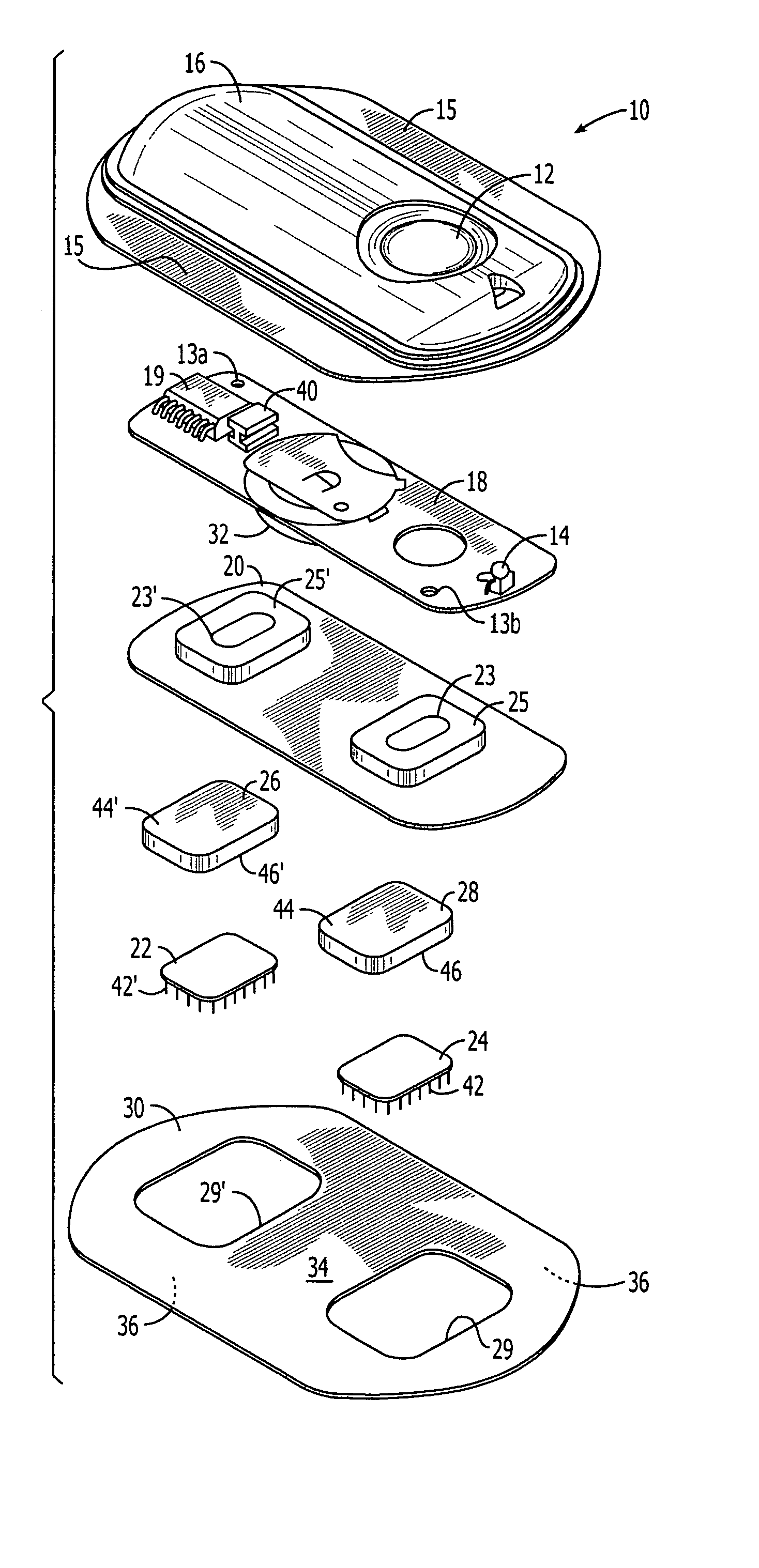
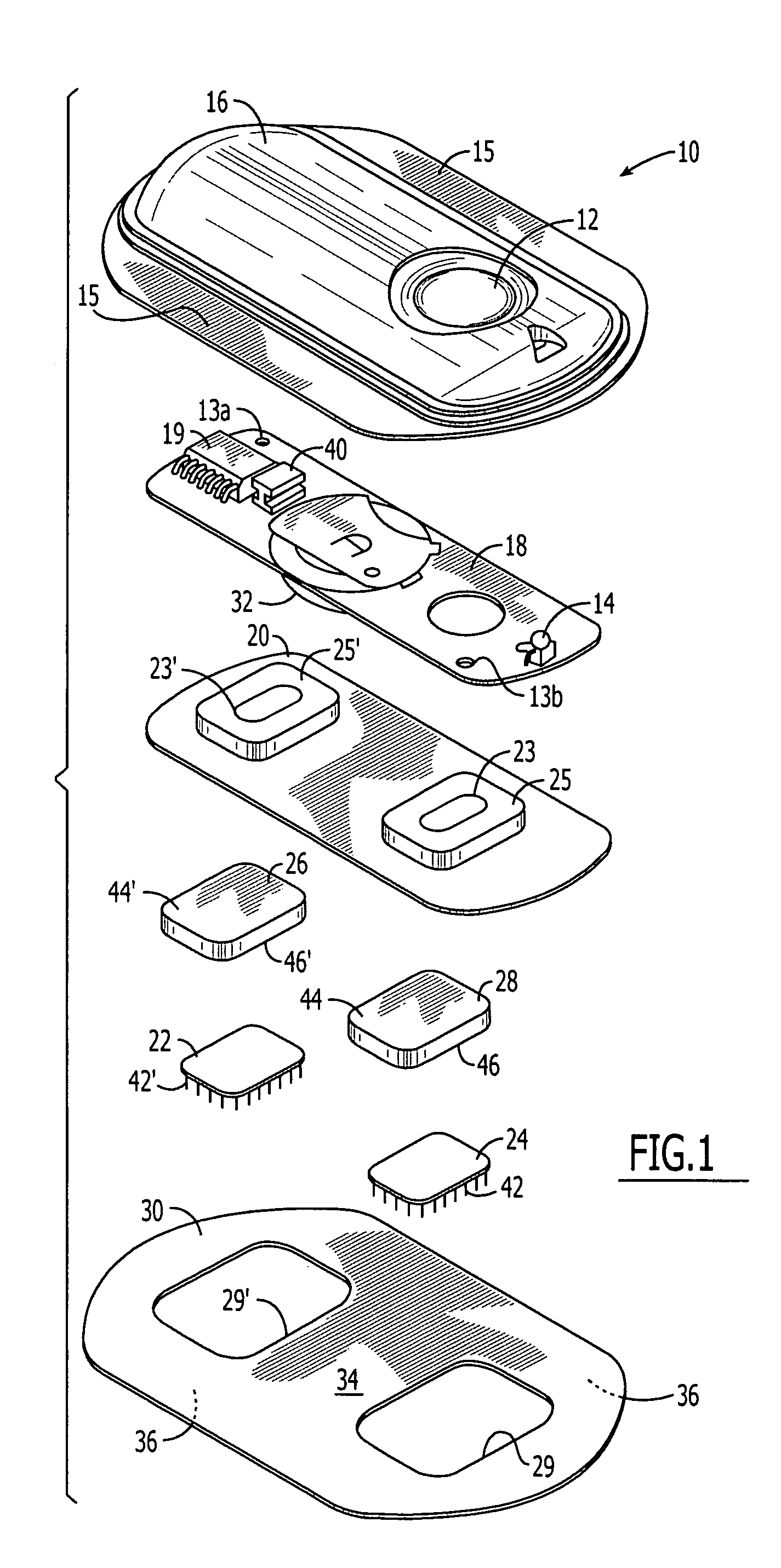
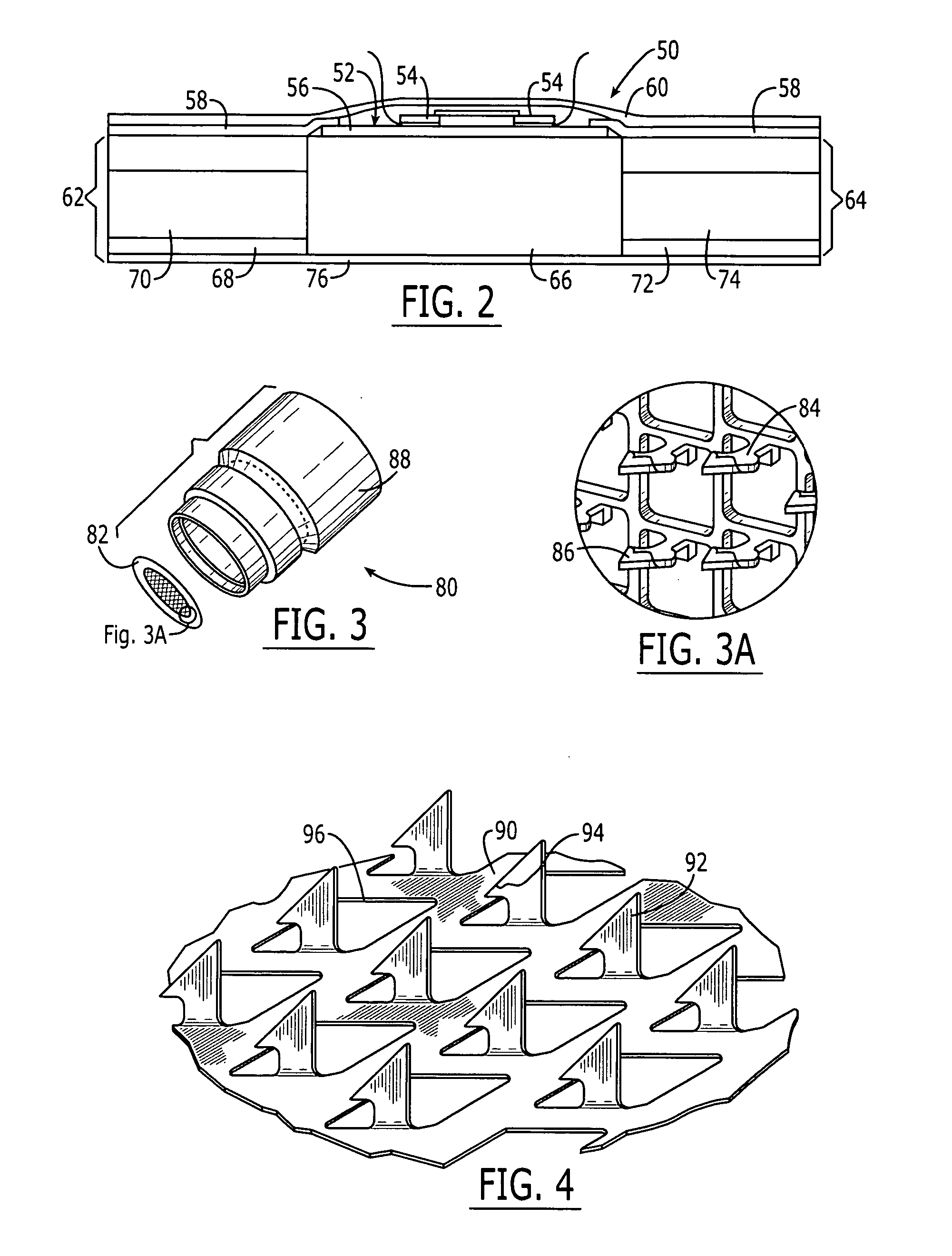
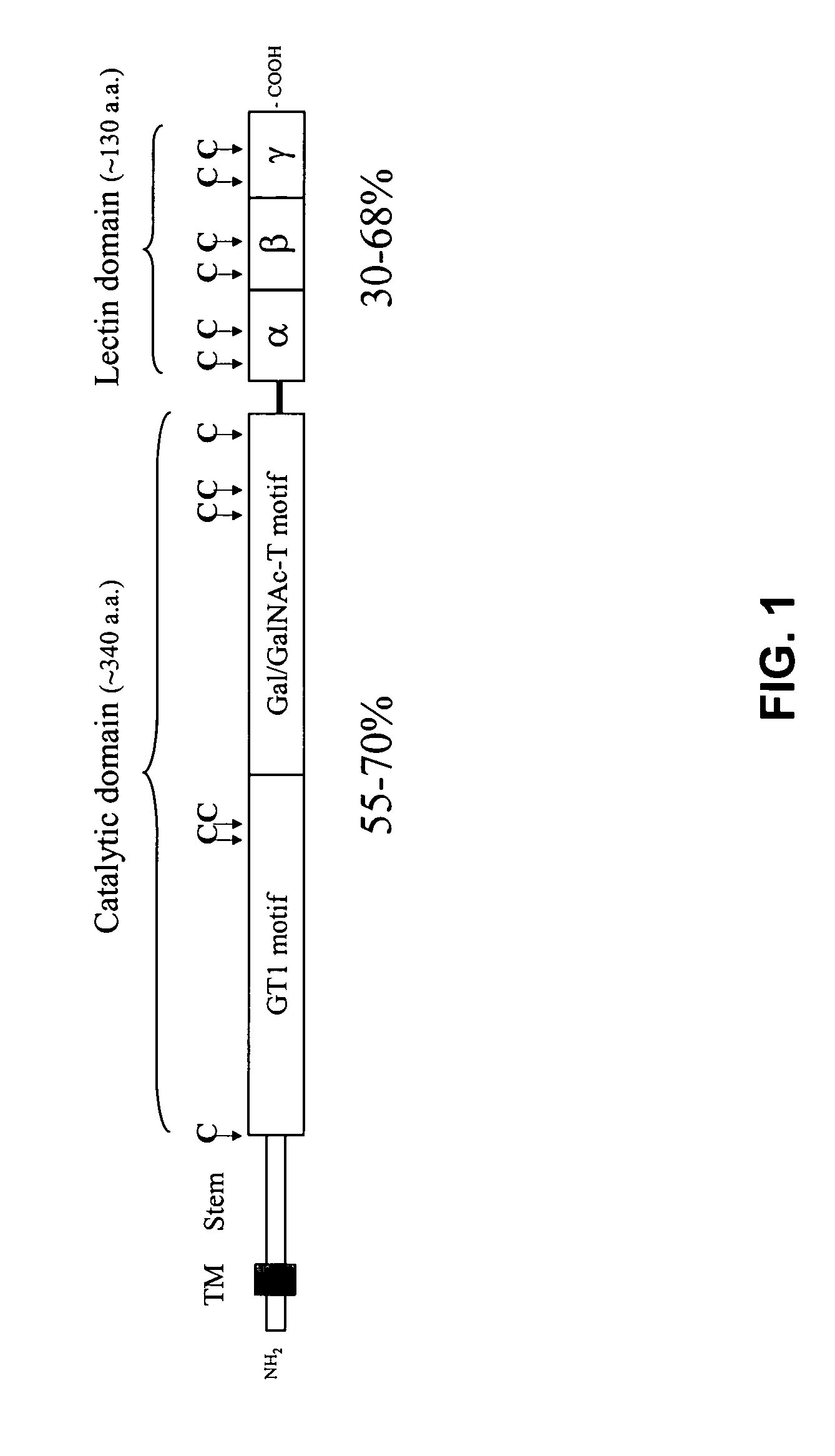
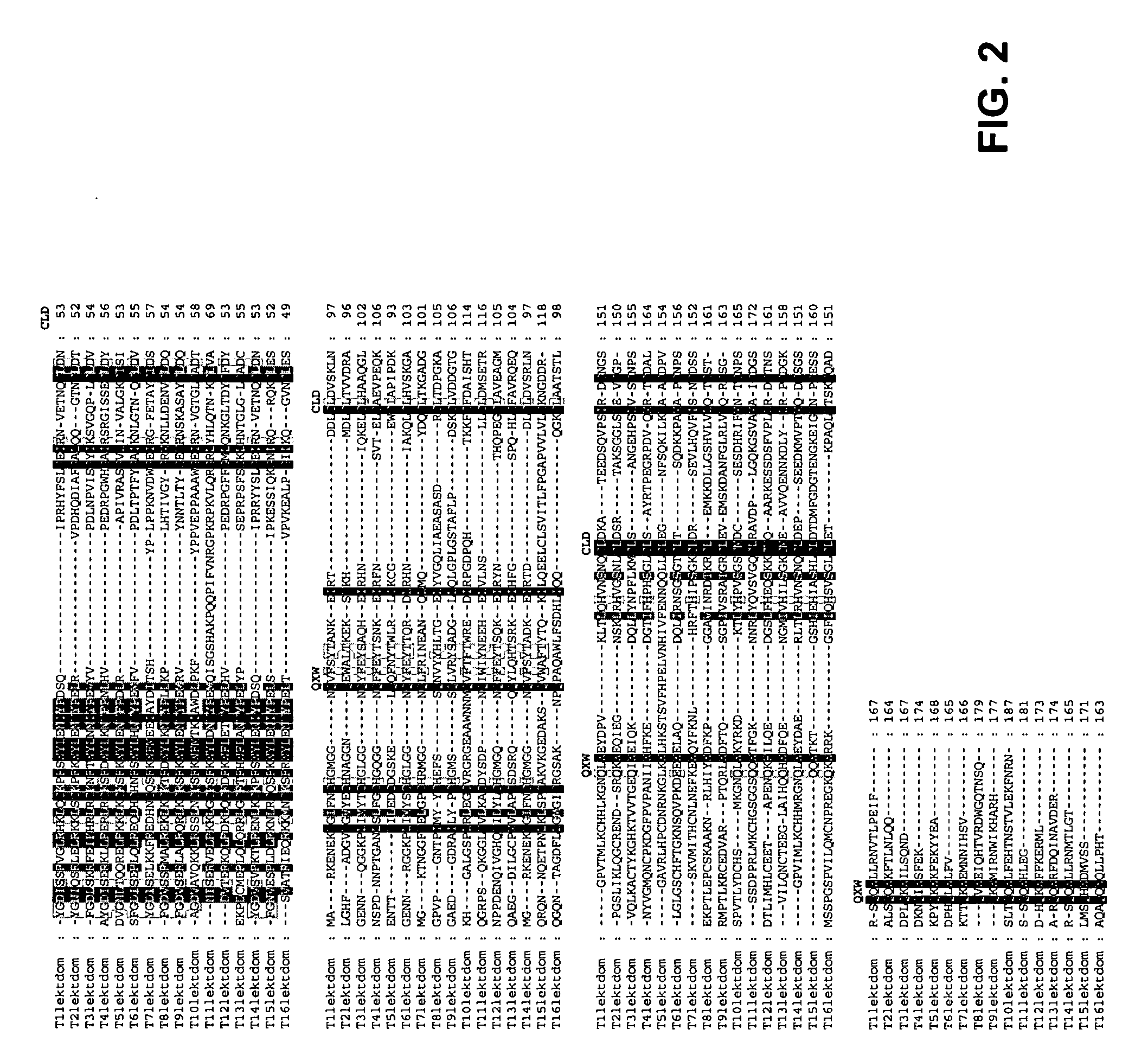
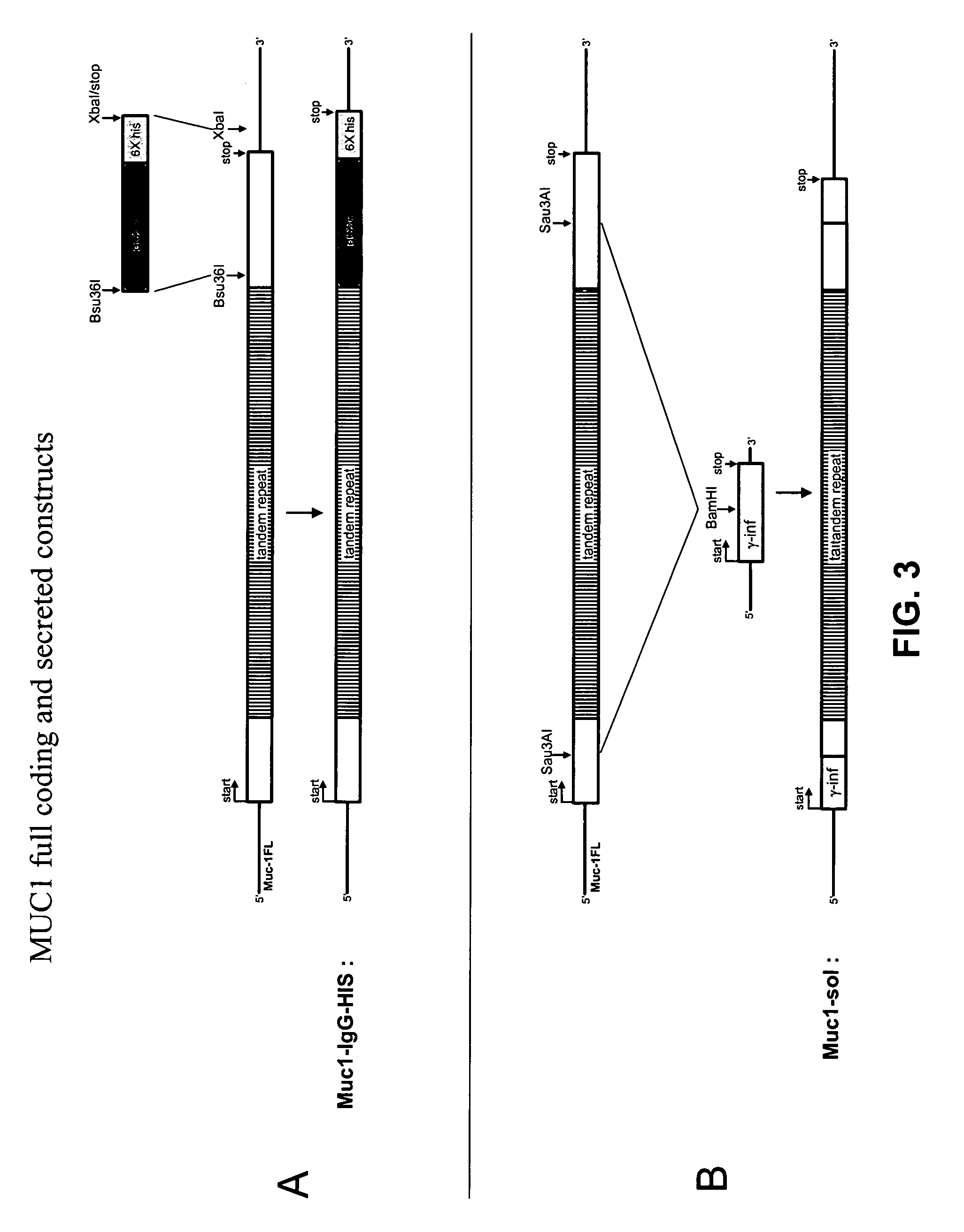
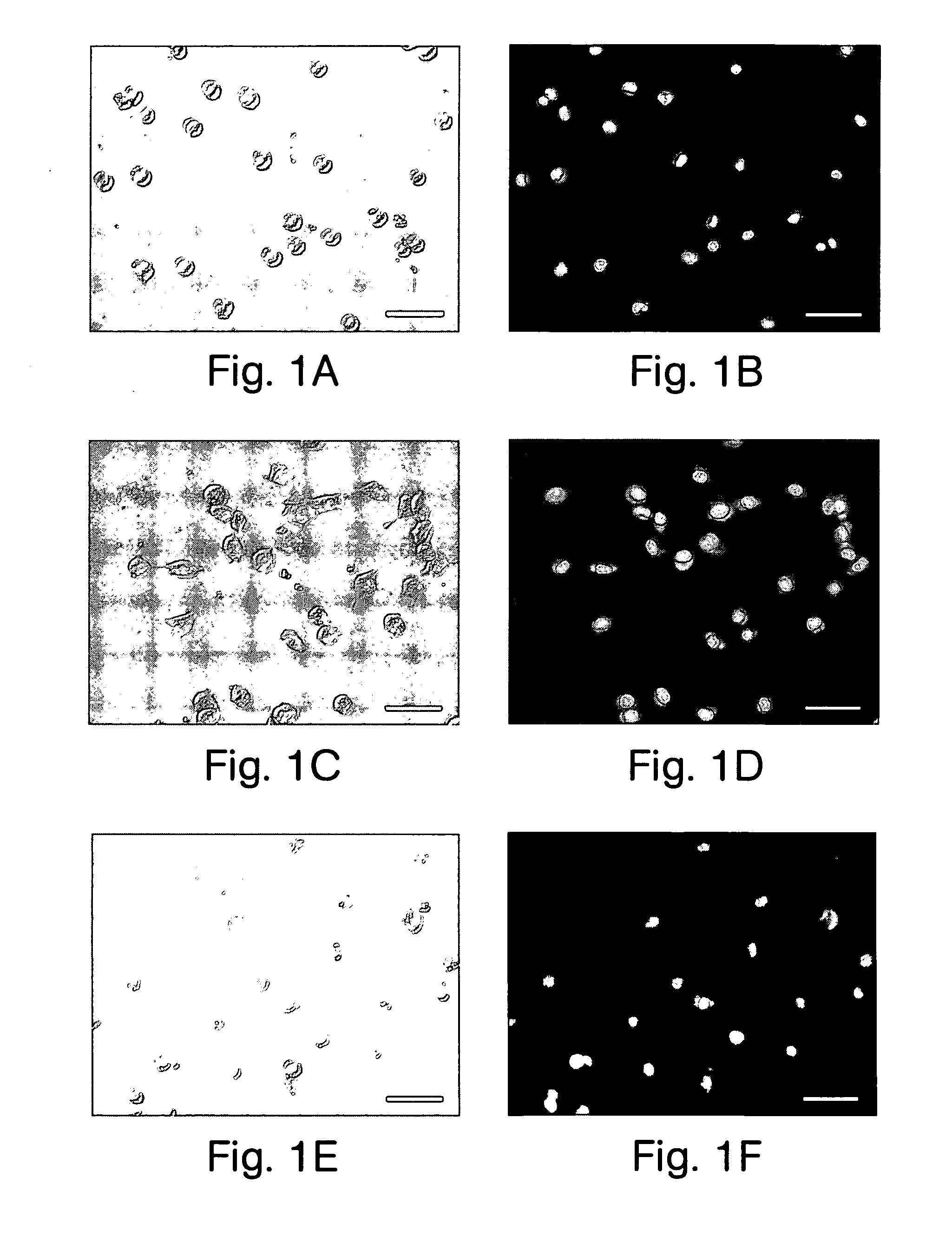
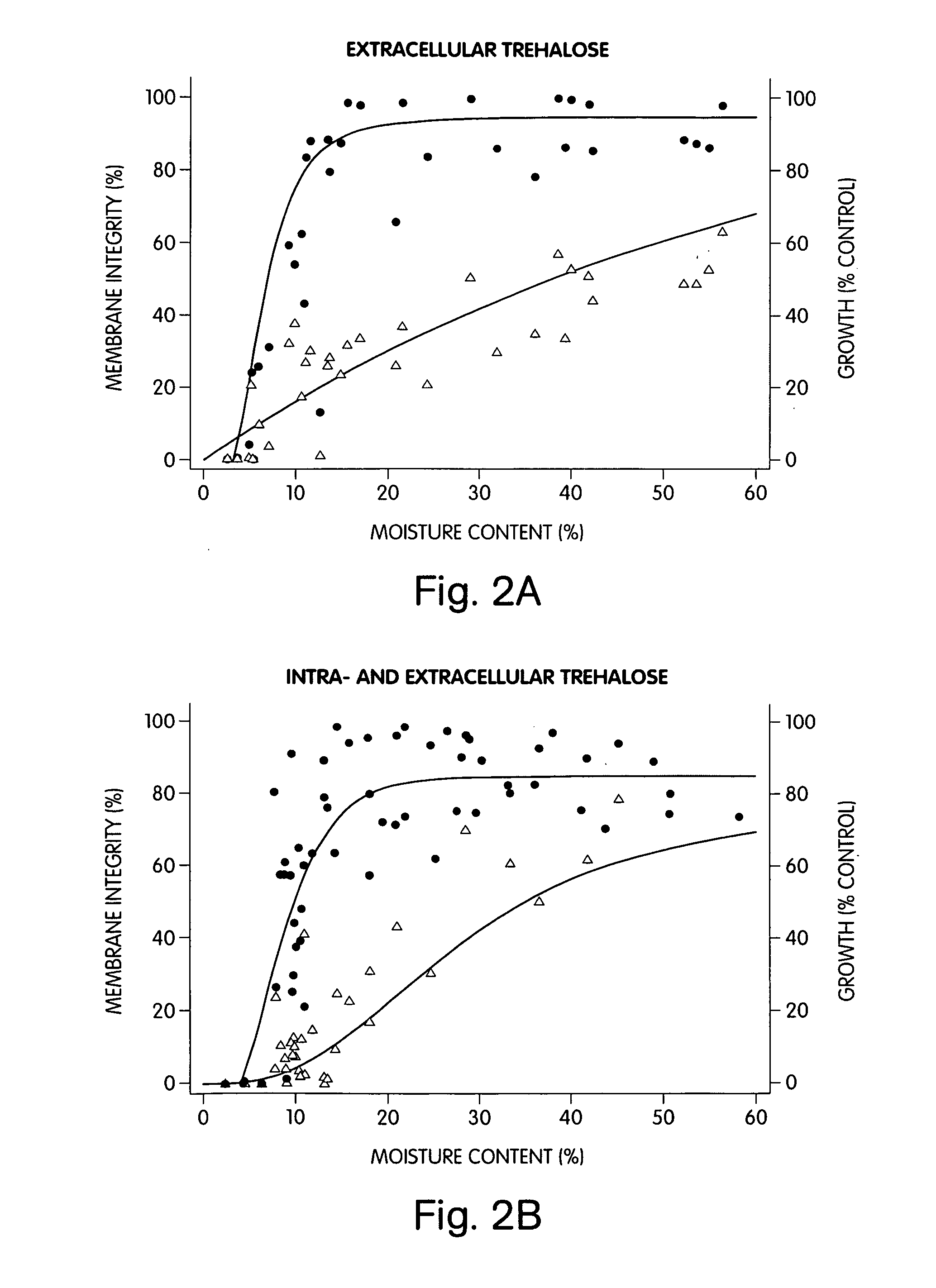
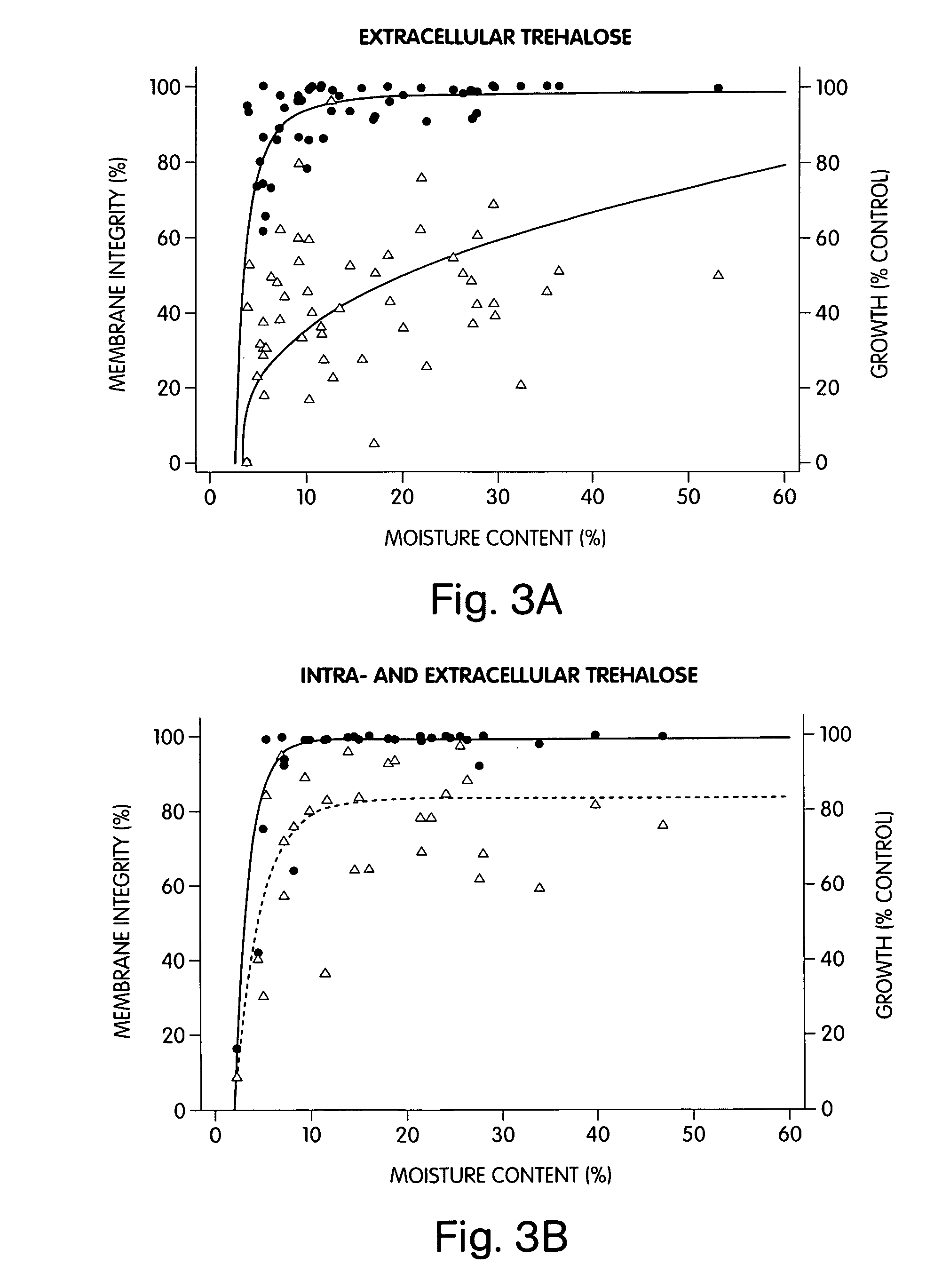


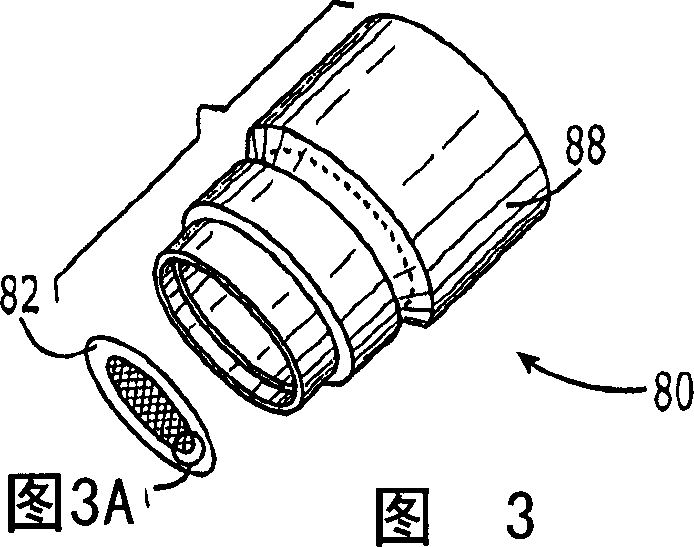
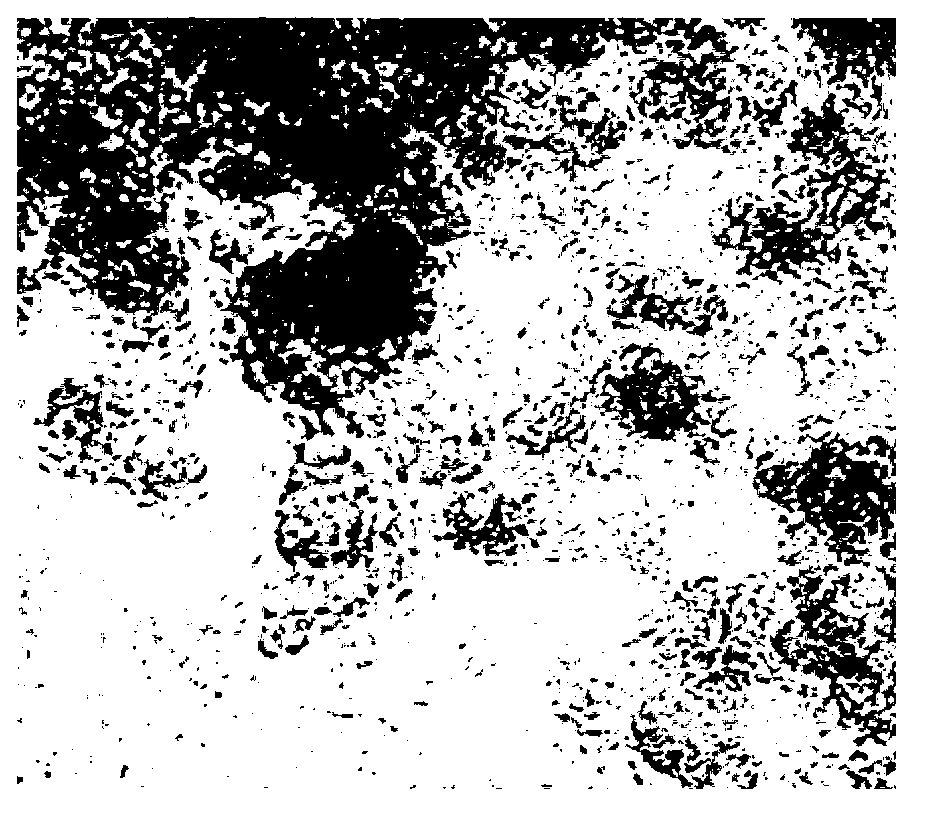
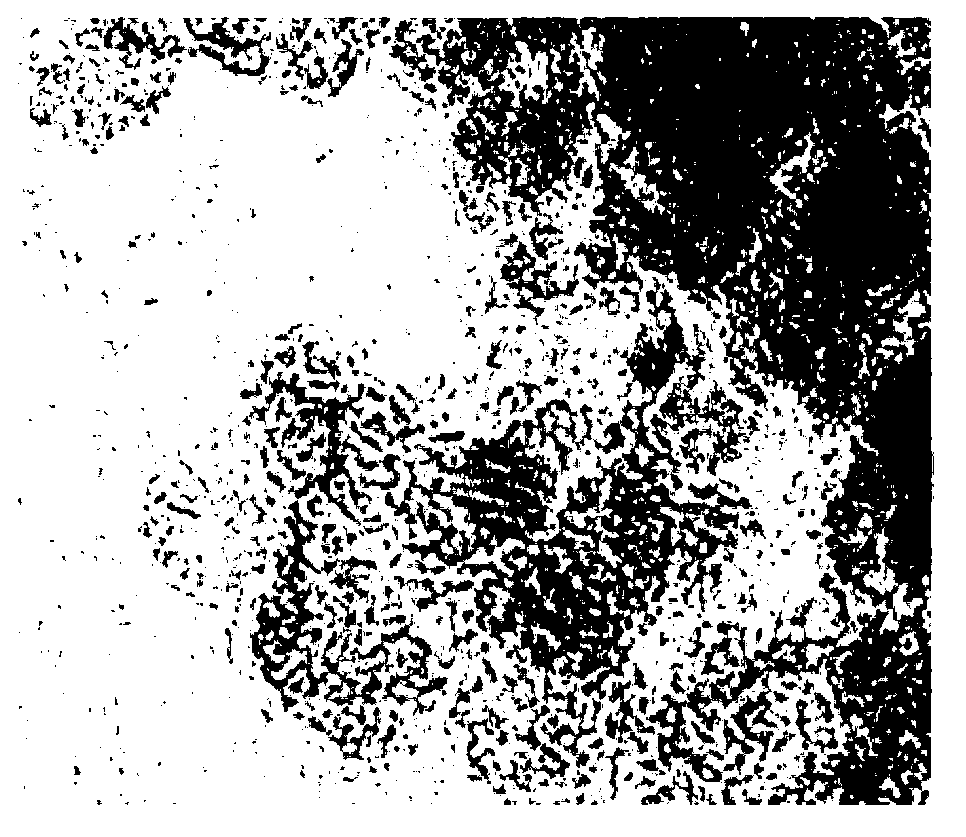
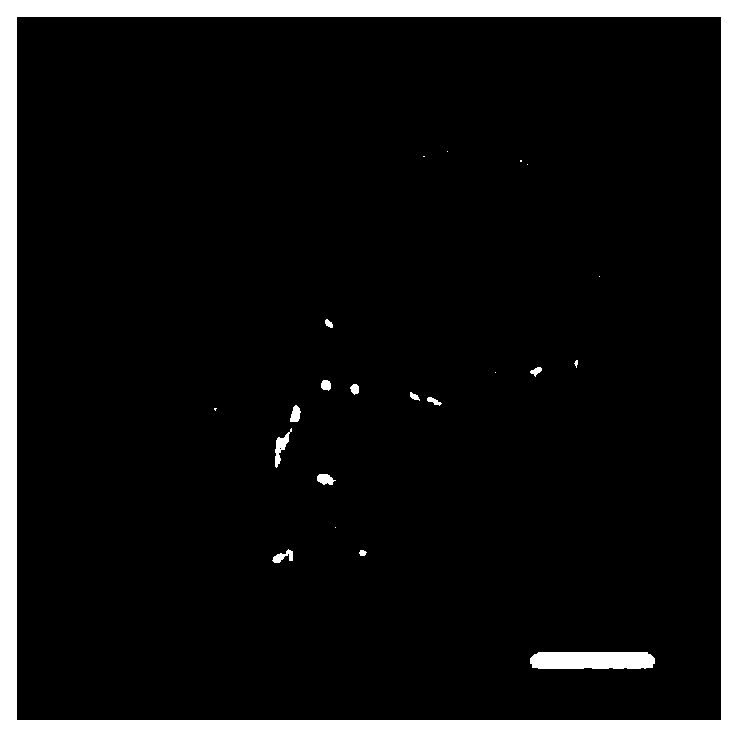
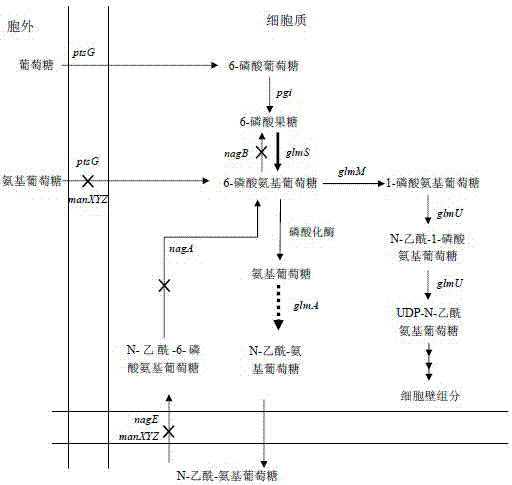





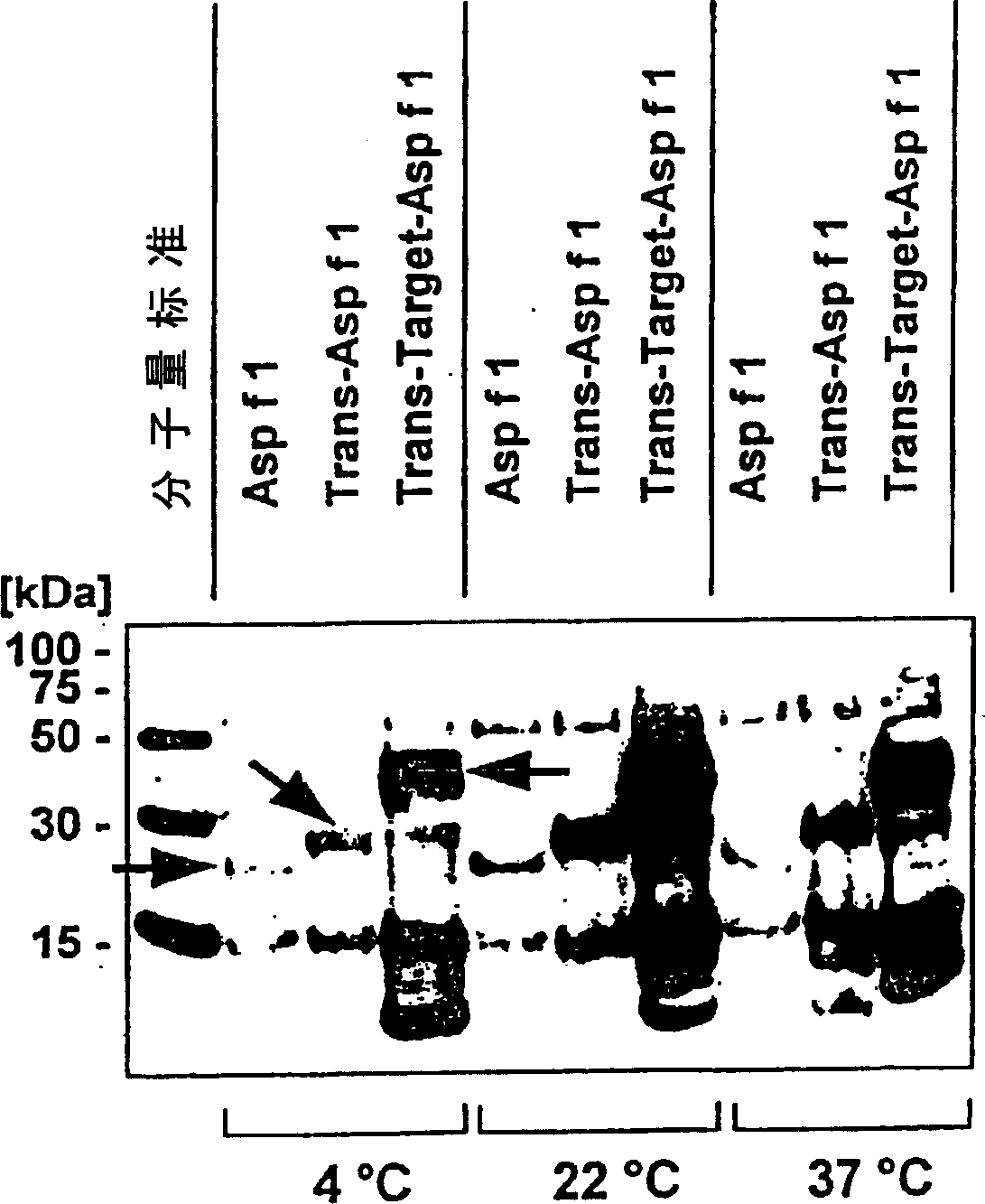
![[12] aneN3 cationic lipid containing targeted group and fluorescent group, transgenic vector, and preparation methods of cationic lipid and transgenic vector [12] aneN3 cationic lipid containing targeted group and fluorescent group, transgenic vector, and preparation methods of cationic lipid and transgenic vector](https://images-eureka-patsnap-com.libproxy1.nus.edu.sg/patent_img/a9418184-cd97-49fc-be12-62b9c4d99c2b/HDA0000874188930000011.PNG)
![[12] aneN3 cationic lipid containing targeted group and fluorescent group, transgenic vector, and preparation methods of cationic lipid and transgenic vector [12] aneN3 cationic lipid containing targeted group and fluorescent group, transgenic vector, and preparation methods of cationic lipid and transgenic vector](https://images-eureka-patsnap-com.libproxy1.nus.edu.sg/patent_img/a9418184-cd97-49fc-be12-62b9c4d99c2b/HDA0000874188930000012.PNG)
![[12] aneN3 cationic lipid containing targeted group and fluorescent group, transgenic vector, and preparation methods of cationic lipid and transgenic vector [12] aneN3 cationic lipid containing targeted group and fluorescent group, transgenic vector, and preparation methods of cationic lipid and transgenic vector](https://images-eureka-patsnap-com.libproxy1.nus.edu.sg/patent_img/a9418184-cd97-49fc-be12-62b9c4d99c2b/HDA0000874188930000013.PNG)

